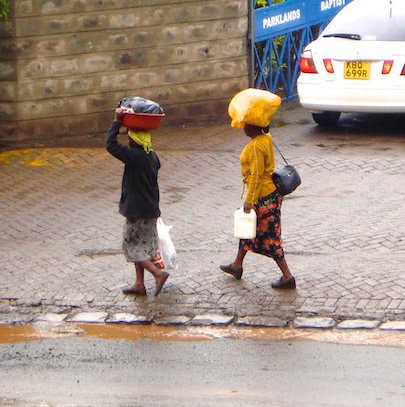Nairobi, November 30
Hello. As you can see, I’m on the road again. This time, I will be piloting ten days of business management training for the owners of private medical practices in Kenya.
I have to say that my travel to Africa this time went exceptionally smoothly. After the experience of paying $1200 to send training materials that could have easily filled one large suitcase- and finding out that I actually could take two bags for free on Delta, I wised up. I’m traveling with two large bags (bright pink and bright blue) that each weigh 50 pounds. In addition, I have my large handbag that could hold a small child (but doesn’t) and my “carry on” with all of the training files, laptop, iPod, camera, iPod station, etc. that probably weighs 40 pounds on its own.
I got expedited treatment at the Madison airport, so I didn’t have to take off my shoes, etc. I just had to put my stuff and my laptop on the conveyer belt. In Detroit, I had no difficulty making my connection to Amsterdam- a 9-hour flight. People are so kind. There is no way that I can lift my carry on over my head to reach the onboard luggage. A young woman actually offered to lift it for me and took it down so many hours later. The same thing happened on the flight from Amsterdam to Nairobi (8 hours).
The woman seated next to me on the first long flight was also going to Nairobi. Her daughter was graduating from her boarding school. Then they would join her husband in the Sudan, where they were building homes.
On the second long flight, I had the window seat in a row of three seats, but there was no one between the gentleman on the aisle and me. It made cramped seats much more comfortable.
It’s interesting how different countries handle security checks. I had to hand over my passport, immunization record- then look into camera, then give them electronic impressions of both of my hands. I kept having to ask the gentleman to repeat what he said because: (1) I have a cold so I’m stuffed up; (2) my ears were still closed from the trip; (3) there was constant loudspeaker voice overs; and (4) I had no idea what he wanted me to do!
I can’t tell you how lucky I am that my dear friend Jerri gave me colorful round happy face tags for my luggage. Standing with hundreds of folks in the Nairobi airport, it made it much easier to find my bags. Again, people were very kind to help me lift the bags.
I was a little nervous going past customs because they ask if I have anything to declare. I just hope and pray they don’t decide to open up the suitcase filled to the brim with kinesthetic training objects and prizes. I think it might be difficult to persuade them that I’m actually going to use those things with adults in legitimate training sessions- rather than selling them on the black market as children’s toys. But, I think looking old and weary helped- he only asked me if I had anything to declare and I said “no.”
I then pushed the luggage cart outside, where there must have been about 100 people waiting to pick people up, holding up names on signs. At first, I didn’t see my name. But James was there- a young Kenyan born and raised in Nairobi.
Oh, I have to tell you- as we were driving away from the airport, there was a zebra standing on one of the traffic islands! Apparently the game preserve is right next to the airport and some of the animals escape every now and then! What a treat!
James will be my driver for the duration of my stay (2 weeks). He’ll take me anywhere I want to go! I’ve already told him that I’d like to go to an open market for Kenyan crafts and on a safari.
My hotel, the Nairobi Serena Hotel, is 5 star. Fresh fruit in the room, controls that work the lights and thermostat from the bed (!), free Internet, free breakfast, and a huge room. Very nice!
I left Madison at 2:30 p.m. on Friday, November 29tth and arrived at my hotel at 2:30 p.m. CST (11:30 p.m. Kenyan time) on Saturday, November 30th. It’s been a long but not unpleasant haul. I watched movies during the first long flight and read my Nook for the second long flight. I had purchased one of those donut pillows to go around my neck, but it really didn’t do anything for me- and obviously, I didn’t sleep.
I’m looking forward to a long shower and a longer sleep!
More tomorrow, when I’ll find out what my schedule is and where I’ll be training, etc.
Nairobi, December 1
Well, I definitely do not recommend international travel (or any travel, for that matter) when incubating a cold. Luckily, I have both Sudafed and Dayquil and am using both as prescribed.
Last night, I made a meal of the fresh fruit in my room: purple seedless grapes and two very fresh oranges. There are other fruits and I have no idea what they are. I’ll have to ask someone!
This morning it was raining and very humid. I wandered around the lobby area. This hotel is like a Kenyan cultural museum! I took photos of different textiles, head rests (yes, carved pieces that people use to place their heads to sleep on- see attached photo), kitchenware art (made of melted down pots and pans), wood sculptures, beadwork, etc. The gift shop was like its own work of art. The man there kindly let me take photos of everything.
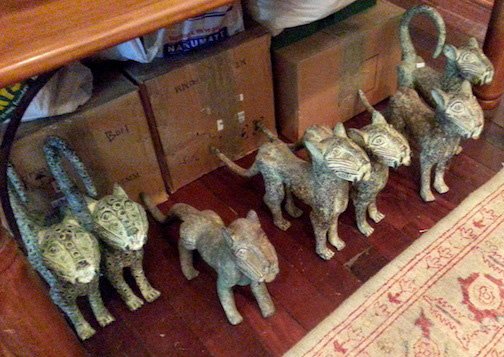 I noticed what looked like cat sculptures- He explained that these were Benin leopards that people put on either side of their doors. I asked if they were intended to scare off evil. He laughed and said he thought they were to indicate the power of the inhabitants.
I noticed what looked like cat sculptures- He explained that these were Benin leopards that people put on either side of their doors. I asked if they were intended to scare off evil. He laughed and said he thought they were to indicate the power of the inhabitants.
I’ve attached a few photos. The one of the woman with the pipe is fascinating. Apparently, the women use these long stemmed pipes so that they do not spill hot tobacco on their babies when they are nursing them. Many of the pipes are beaded, which makes them easier to hold (not as hot).
Other photos include: a certain tribe of men who wear tight beaded vests; the Benin leopards;
I found the breakfast buffet, which was still open, to my delight. I filled up on various juices (a woman getting some juice explained what she thought some of the 10 different pitchers of juices contained. There was a bright pink juice and a light green juice, both of which were types of watermelons. I went for the yellow juices, mixing them up in three large glasses. They seemed just the thing to fill me with vitamin C to help me fight my cold.
I 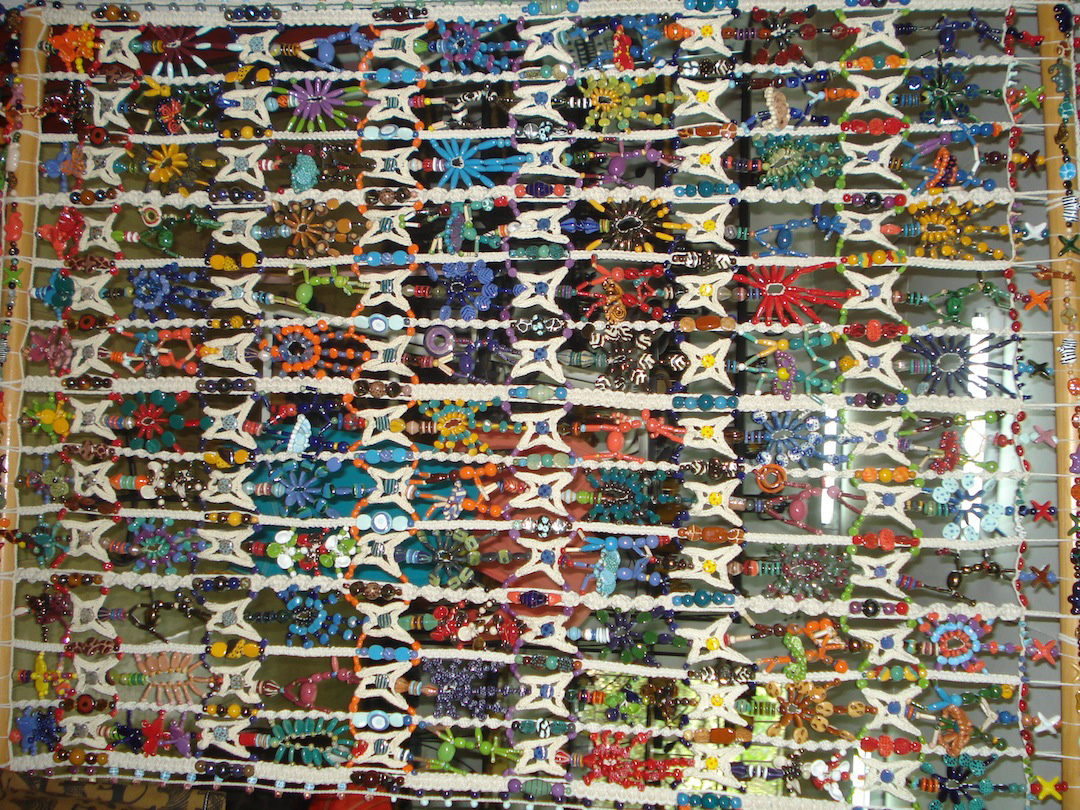 was too late for any hot dishes, but they looked like they would be great tomorrow. I filled my plate with lots of different cut fruits and grabbed an apple, two oranges and a banana to take back to my room. The pastry display was mostly breads, which is good. That will help me minimize my intake!
was too late for any hot dishes, but they looked like they would be great tomorrow. I filled my plate with lots of different cut fruits and grabbed an apple, two oranges and a banana to take back to my room. The pastry display was mostly breads, which is good. That will help me minimize my intake!
After a wonderfully fruity meal, I went to speak to the concierge about a day safari. He showed me a number of options, so I asked him which he thought would be the best. He chose one that involves an all-day adventure, starting at 7 am with a 2-hour drive to a park (I’ll have to get more information about its name), a drive through this very large game park, lunch, more touring, then driving back to the hotel late that evening.
He explained that, in this tour, I’ll be able to see the countryside, the rift (?), lakes, lake birds, and large game animals. I’ve already read that some people are able to see 100 birds in a day! That would be absolutely spectacular!
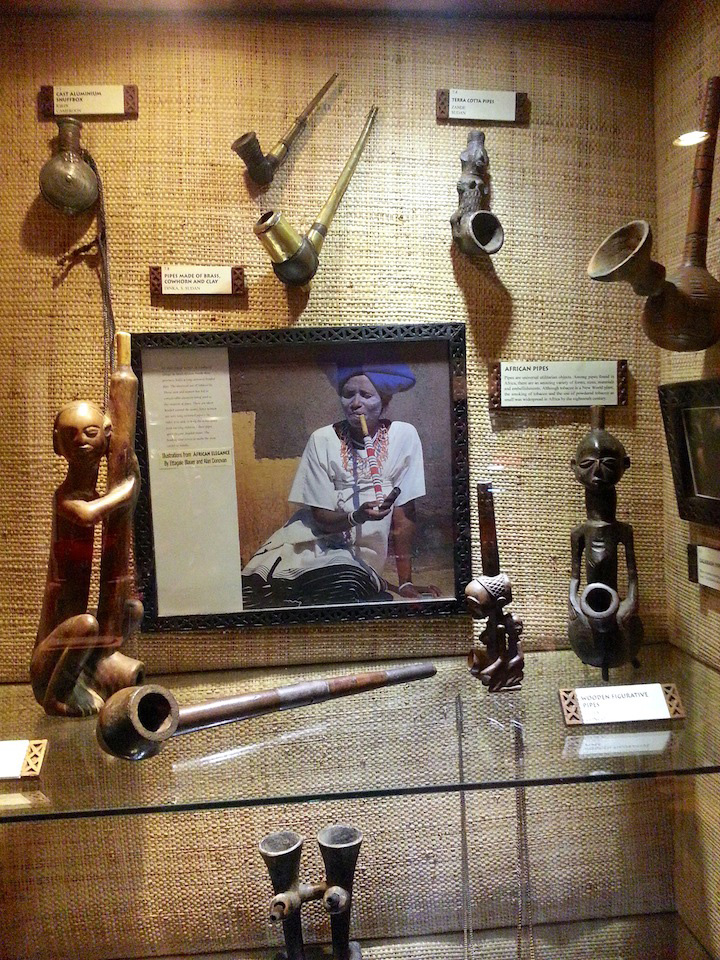 I’ve scheduled it for next Saturday. I’ll hope it isn’t raining. However, it appears that the rain doesn’t last all day. And even if does, the van has a canopy.
I’ve scheduled it for next Saturday. I’ll hope it isn’t raining. However, it appears that the rain doesn’t last all day. And even if does, the van has a canopy.
Every member of the staff that I’ve met in the hotel is welcoming and pleasant. The restaurant hostess, in native dress, graciously agreed to let me take her photo. The young man who was cleaning rooms kindly gave me an extra box of tissues, plus a bowl of fresh fruit.
It is just before 1 p.m. and I haven’t heard back from any of my contacts: David, Tim (I just found out that this is David’s last name), or Mbogo. I do have their phone numbers and may need to call them if I don’t hear back by evening.
I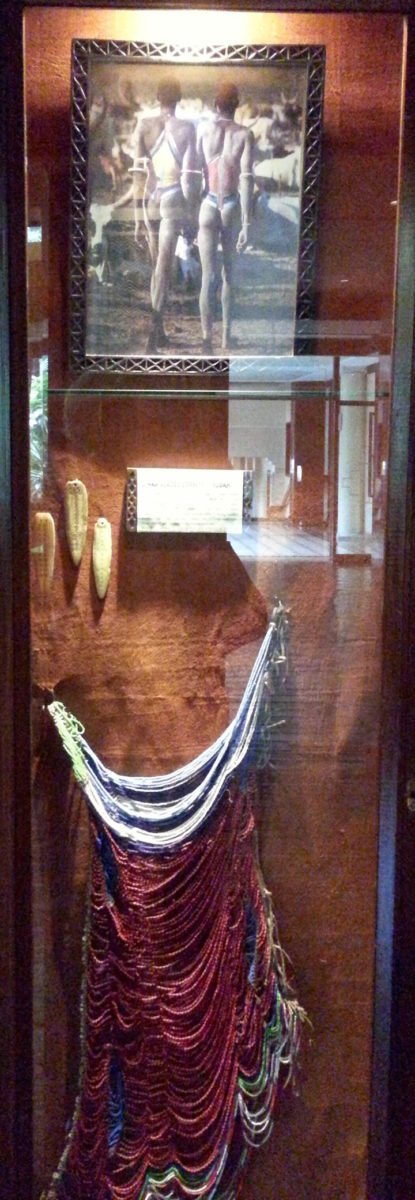 t’s now after 9 p.m. and I still have no answers. To say the least, it’s stressful. I’ve called everyone and reached I have phone numbers for except for Mbogo. Unfortunately, I’ve been told that he is the only person who can answer the questions- which, by the way, I have asked him twice by email even before I left the states. Deep sigh.
t’s now after 9 p.m. and I still have no answers. To say the least, it’s stressful. I’ve called everyone and reached I have phone numbers for except for Mbogo. Unfortunately, I’ve been told that he is the only person who can answer the questions- which, by the way, I have asked him twice by email even before I left the states. Deep sigh.
Well, at least I now know that anger and frustration can definitely get my mind off of my cold!
December 2, 2013 Module 7 Nairobi
Hello.
This day could have been MUCH better if:
- Mbogo had bothered to contact me on Sunday regarding arrangements, rather than turning his phone off to spend time with his family
- I had been told before 8 am of the scheduled training that I would be training Module 7 and that the program started at 9, not 10
- Someone had already moved the chairs and tables, rather than leaving it to me
- The room had any air conditioning or fan
- Austin’s staff had duplicated the materials as I specifically instructed, back to back starting with the title page- instead of printing them so that no one could see the page numbers
- I had had more than 45 minutes to:
- Move tables and chairs
- Lay out materials
- Put up kites
- Obtain and sync with the LCD projector
- Obtain something to use for name cards
- A consistent message had gone out to participants regarding the start time, rather than one that said 9 am and another that said 10 am
- My iPod was charged so that I could play music [my oversight]
- The bathroom had: toilet paper, SOAP, paper towels, toilet seats and a mirror!!!
- The LCD projector stayed on instead of frequently turning off
- The tiles on the floor were not buckled so that people tripped and got frightened that the floor would cave in
- I didn’t have to spend the entire day soaking wet from perspiration
- We didn’t have to run the program as if it had started at 10, even though 8 people were there by 9 or before
- We didn’t have to go until 2 instead of 1, with no snack or lunch
- The gallery walk didn’t have to fit in a hall that was too narrow for people to stand in front of the flip charts without crushing each other
- Participants could find the location (two came an hour before we ended and one came just when we ended)
What went well:
- The participants were appreciative and engaged.
- I got a lot of additional material to put into the facilitator guide
- Austin offered to and will properly duplicate the materials
- His assistant graciously made name cards by folding paper
- The participants really enjoyed the activities, especially the gallery walk
- Most if not all of them will be attending the training for the week
- My driver, James, stayed to help me move tables and chairs
- It was not raining
- People helped to set up when they got there and others helped to clean up at the end of the session
- Participants liked my teaching style and the approach to adult learning
- We had great discussions
- A number of the participants indicated that they were going to have to make changes in how they handle medications and medical supplies
There were 18 participants (at various times).
My analysis:
The training content and methodology works
The facilitator guide will need to be revised with the addition of answers and key points
Now, for the rest of my day! I got in the shower as soon as I got back to my room; washed my unmentionables and put them out to dry in the shower, typed up my report for the day, uploaded photos for the participants- and then tried to decipher their handwritten email addresses. I gave up, finally, and sent an email to Mbogo to get a list. Of course, no response. Sigh.
Famished by 5 pm., since I’d had no lunch and breakfast was a very distant memory at 6 am, I got dressed to go to the restaurant. On my way, I went into the beauty parlor to see if they did manicures and pedicures. Yes, they did and I had a lovely long session with a beautiful young Nairobean (sp?). She taught me how to say Hello, my name is Deborah, and welcome to the training in Swahili. I wonder what I’ll actually be saying when I try it out tomorrow!
She also told me to go to a Masai Market for Kenyan arts and crafts. I’ll definitely do that.
As for my Saturday safari trip, my driver, James, will take me instead of a tour. That will help both of us financially.
I’ve recharged my IPod, so hopefully I’ll have music tomorrow. It was very barren without it today.
Everyone has ostensibly been alerted to the fact that the training begins at 9 and ends at 1. I should be able to get lunch at a reasonable time- and, if I’m feeling particularly perky, to check out a market or at least go convert some cash to Kenyan shillings.
This treat to myself (manicure and pedicure, lasting two hours) cost only $28! Now I’ve ordered some dinner and will prepare for tomorrow, since I know what I’ll be teaching ☺.
It looks like NW Wisconsin is in for the first big snow storm. I hope it doesn’t hamper anyone or get down to Madison!
Nairobi, December 3
Hello. I realize that I haven’t told you much about my experience with the Kenyan culture. Here is a hodgepodge of observations:
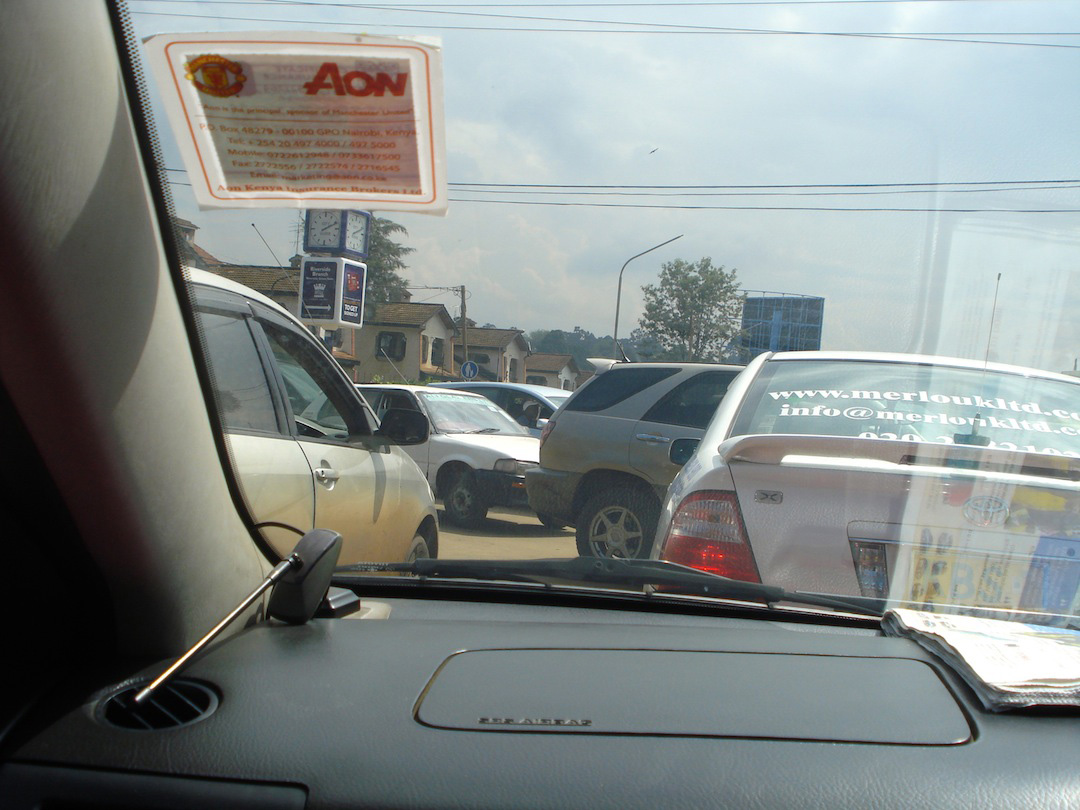
We travel less busy roads, moving through lush rainforest foliage and brilliant flowering trees with scarlet or yellow or orange blossoms cascading down from great heights. These are clearly the good neighborhoods, because the houses are large and well landscaped, and many have orange tile roofs.
There are speed bumps everywhere, to slow traffic where cars come out of estates or the state house, etc.
The round abouts are even wilder than I’ve experienced in Nigeria or in Jordan. James, my lovely driver, moves the car like he is threading a needle. He will move into what looks like no space at all, turn quickly, weave through traffic that is going every which way- while coordinating his fleet of taxi drivers over his cell phone! He seems to know how to get me where I need to go, despite enormous amounts of traffic.
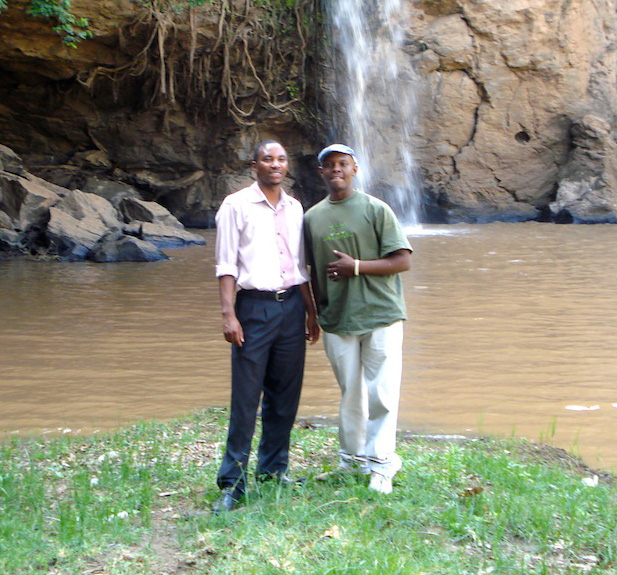
The cars that I’ve seen look either new or pretty well cared for. James drives a Toyota wagon that is very comfortable and well equipped. I even noticed that he has air conditioning capability, although he hasn’t turned it on. Driving with the windows down really does provide a nice cooling breeze.
The Kenyans are very serious about security. Yesterday, when I first went to the SHOPS (Strengthening Health Outcomes through the Private Sector), I had to show and leave my passport with a security desk of three people. We were met by someone posted at the elevator and escorted to the office.
There are security checkpoints with gates and guards with special rods to check cars for explosives almost everywhere you look.
Labor must be very cheap, because a large number of staff is employed: 2-4 guards standing in front of a building all day; 3-5 porters and security personnel stationed at the front of the hotel.
In the hotel, they have men in dark suits stationed on every floor near the elevators. They are very pleasant.
I can’t imagine standing around all day!
Both yesterday, leaving the training site and today, going to the training site, I joined other people in elevator cars that had no lighting! Talk about freaky.
As I’ve observed in Nigeria and Zambia, people of all ages walk everywhere- in native clothing, American dress, suits, high heels, casual wear. They also carry loads (bags, a stool, who knows what else) on top of their heads.
James took me to an exchange where I could convert some of my cash to Kenyan shillings. There was quite a line and then I noticed the sign declaring rates. If I had $100 or $50 bills, I could get 84%. If I had 20s (which is what I have) the rate was 72. Since I knew that the hotel rate was 83 without any discrimination about the denominations I would cash in, I just got back in the car and took care of the transfer at the hotel.
James really looks out for me. When he realized that I had no phone, he got me one! (It’s from the SHOPS office, so Mbogo probably should have arranged for me to have it when I first arrived. It is already programmed with everyone’s numbers. I just need airtime, which James will obtain for me. This will make life much easier for me.
James also reported that there were three Masai markets scheduled this week. One was today and the others were on Saturday and Sunday. Since he is taking me to the Nakuru game park on Saturday, I didn’t want to impose on his time with his wife and two little ones (2 and 4) on Sunday. However, I was very tired and not really in a shopping mood. Luckily, he preferred that we go on Sunday because there will be no traffic and travel will be much easier. Problem solved.
The folks who come to the training are warm and engaging. Yesterday, I complimented a woman on her native dress and she asked me if she should make one for me. I said “Yes,” thinking that she was just teasing me. However, I really think she may do it!
Today was a much more comfortable training day. First of all, I didn’t need to rush around. Rachel, who works at the training site, opened windows on three sides of the room, which gave us a very nice breeze for most of the day.
I brought soap, only to find that Rachel had brought some as well. I teased her that now we need a towel- and I fully expect that she will bring one in tomorrow.
Austin, bless his heart, reprinted the training materials so that the page numbers were easy to see. He also gave me the email addresses of the participants in yesterday and today’s classes, so I could send them promised photos of flip chart work, etc.
I discovered that there was actually a ceiling fan right above me, so I turned it on. Then it wobbled and groaned so much that I quickly turned it off again!
The class has migrated to the right of the classroom because more tiles have buckled on the left. However, I fully expect that, by the end of this week, we will all be standing flush with the right hand wall, because more tiles buckle every day.
Austin told me that his training group will be moving in January. I sure hope that the floors last that long! And that they find a building with elevators that stay lit!
There are already a number of people who have attended both classes and are incredibly perceptive and articulate. I’m learning a huge amount from them, some of which is pretty demoralizing. In a conversation about the need to have documentation of follow up for patients, they told me that the watchmen at some clinics tell potential patients that the clinic has no power or the x-ray machine is bad, etc. and refer them to another place (that pays the watchmen kickbacks). Yikes!
Interestingly enough, while I was waiting to convert my cash, I overheard an employee call another with an urgent message: someone needed to check into the mini bar payments because one room was charged 15,000 KS when the people who stayed in the room never opened the bar.
A different example, this time of the participant’s wisdom. Paul Ogoo said that he wouldn’t be able to attend the session on Friday that focuses on business growth. So, he wanted to let me know that the training program should also focus on the much more difficult and complex issue of business reduction. What staff do you let go, how do you redistribute the work, etc? I told him that we were interested in seeing businesses grow not die, but I would definitely forward that recommendation.
Today’s session focused on how to manage medical records. Most of the organizations represented (small medical practices and hospitals) do very little in the way of auditing records for completeness and do almost nothing in the way of auditing the medical records for quality. They do not have written policies or procedures to ensure consistent and confidential handling of records.
As a matter of fact, Melvin, who is a trainer with his own business and very bright, mentioned that staff often take patient files so they can scam and bill them directly!
The class began with 6 people and ended up with 18. At the end of the session, they brought up the fact that next Thursday is a national holiday. So, I tried to decide which two modules could be covered the same day. Then, after class, Austin informed me that the government also declared Friday as a national holiday.
At my look of (I don’t know, regret, frustration, exhaustion, simple disbelief?) he quickly said that the training days were scheduled and whoever wanted to come should come. He saw no reason not to continue with the scheduled training. So, that is what I’ll do.
Tomorrow, Mbogo has scheduled for me to meet with representatives from a college that might be interested in providing this training. He set the meeting for 2:30. My class ends at 1 and it takes me until 1:30 to shut down, repack and/or hide materials. It also takes about 30 minutes or more to get to the meeting site.
I wrote back to Mbogo that I will be happy to have the meeting, but he needs to provide me with fruit or something because my last meal would have been at 6:30 a.m. He replied that he’ll try to set up the meeting as a lunch meeting. Wise man. He must realize that it isn’t a good idea for me to be both tired and hungry!
Nairobi, December 4
Hello. Sorry to leave you hanging about my adventures on Wednesday. Bottom line, I had no voice, the participants seated themselves virtually on top of each other in two tables so they could hear me. They also began by whispering themselves until I pointed it out to them!
I did try to have one of the participants facilitate an activity, but he was incredibly directive rather than letting the participants volunteer answers. I had to jump in. Luckily, there were a lot of case studies, so they could work among themselves and then report out.
The class was about managing risk in a health environment: telephone protocols, pre-employment credentialing, poor medication management and lack of confidentiality. I can’t tell you how depressing it was to hear all of the unmanaged risks in the participant’s organizations. Each day provides more eye opening information for the participants.
At the very end of the class, a very sophisticated, knowledgeable and beautifully dressed older woman told the group that they needed to join her in a circle dance! And, by golly, everyone did. She called the song “doula” and we clapped saying doula at every other step, then she led off by making some funny movements and the rest of us had to duplicate it. Then back to stepping and clapping until the next person in line came up with a different funny movement, etc. All of the 12 participants kept it going until the end. I just marched and clapped, although I will admit to being tired by the time it was over. What a stitch!
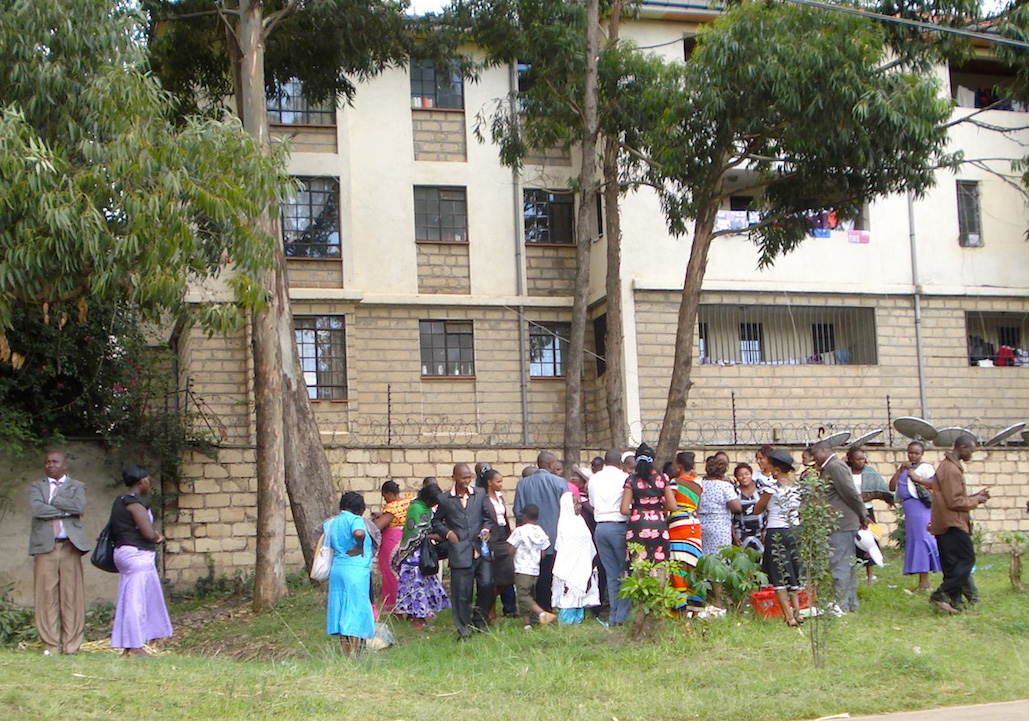 It was difficult to get to the meeting because we had to drive by a university that had just graduated 8000 students. And for each of these students, most if not all came from outside Nairobi and had at least 12 family and friends there to see them graduate. It was easy to note the graduates because they were wearing black gowns with white piping and had green tinsel necklaces around their necks! Cars, buses, vans, trucks, you name it were parked everywhere and people were crossing the streets everywhere, so traffic could not move. Everyone was dressed to the hilt, in various native dress and smart designer clothes. One woman looked like she walked out of Paris, France with very high heels, chic clothing and a huge veiled hat!
It was difficult to get to the meeting because we had to drive by a university that had just graduated 8000 students. And for each of these students, most if not all came from outside Nairobi and had at least 12 family and friends there to see them graduate. It was easy to note the graduates because they were wearing black gowns with white piping and had green tinsel necklaces around their necks! Cars, buses, vans, trucks, you name it were parked everywhere and people were crossing the streets everywhere, so traffic could not move. Everyone was dressed to the hilt, in various native dress and smart designer clothes. One woman looked like she walked out of Paris, France with very high heels, chic clothing and a huge veiled hat!
On the way to the meeting scheduled afterwards with Strathmore University, I started coughing and asked James to drop me off at a supermarket so I could get something to drink. I selected a 1.25-liter bottle of bitter lemon soda, which I chugged the rest of the afternoon. I actually regained some of my voice by keeping myself lubricated.
Strathmore University is quite elite and their Business School is modeled after Harvard Business School. They bring in international lecturers. So, I was mortified to realize that the deeply rutted bumpy dirt road we were on led to the University. James explained that someone who was responsible clearly wasn’t doing what he was paid for- to fix the road.
Although I had told Mbogo that I would need lunch before the meeting and he had said we could have a lunch meeting, there was no lunch. So, I was sick, tired, and hungry for the meeting. However, the man we met with was very gracious (got us hot water in plastic cups and put lime in mine). His university is interested in taking over these 22 modules to help build capacity in small medical practices that have the potential for successful growth.
To give Mbogo credit, he was apologetic about the lack of lunch and wanted to take me to the cafeteria, but I knew I had shopping to do before I could go back to the hotel and have them call the doctor. Before we left, however, Mbogo talked to James about taking me on a circuit on Sunday to see baby giraffes, baby elephants and baby rhinos, as well as the markets.
After that, I had James take me to the supermarket so I could get more candy, since my 2-day supply had been completely consumed. I also wanted to get water, salt, and more of the bitter lemon soda. The place was huge and very crowded (more security for the car and for people entering the store). I wandered around for a while but eventually found what I wanted (although the candy came in small very expensive packages).
When I went to get lemons, they were in two separate places. A man was there to weigh them. He suggested that the lemon with ginger would be what I needed for my cold. So sweet.
I got in line to check out and when I was the 2nd from the cashier, a large woman in native dress holding an overflowing basket walked in front of me and parked herself calmly at the register! I guess that people are rude everywhere. Maybe I was so pale she didn’t notice me???
On the way back to the hotel, we saw large pockets of graduate’s families and friends partying in the median strips and on both sides of the road. I’ve attached a photo.
When I finally got back to the hotel after 6 pm with no lunch yet, I asked the hotel to call the doctor. He was a charming older East Indian who asked about my travels, my personal and my heath history. He gave me a checkup and then prescribed five medicines, which included a liquid for a chesty cough. He also advised me to sit over a steaming kettle several times a day and to think healing thoughts.
He wrote down directions for each medicine, then asked me if I had seen any of the country. When I said no, he drew a map of Kenya and highlighted various places to visit, describing them with great love.
After he left, I called down to registration to see if they had a steaming kettle. They couldn’t understand what I was saying because of my voice, so they sent someone up- who kindly demonstrated to me that the coffee pot in my room would provide steam.
I participated in a Skype call, sent my laundry for cleaning, uploaded photos of flip chart work and mailed them to the participants, ate some soup and went to bed. I would usually have written to you, written a brief report, and prepared for the next day.
So, that is my story for Wednesday.
Nairobi, December 5
Hello.
Before I tell you about my training day, I’d like to give you a partial snap shot of Nairobi and the people I see every day.
Every morning I walk by a ceremonial mask worn by adolescent males before circumcision. (Ouch!)
Everyone asks the morning question, “How was your night?” Jambo means “hello.” Sante means thank you. A response to any thank you is “welcome.”
At breakfast, at least three different servers approach me to see if I need anything and if I am waiting for someone (because of the other table settings). They always want to remove the other settings and I always tell them that they should just leave them. A woman walks around with tiny glasses of beet/ carrot juice. I haven’t tried it, but two days ago I watched a woman accept a glass with great joy. I may have to find out what it tastes like.
There is a fresh rose bud in a vase in the bathroom and on a small table in the room that also holds a bowl of fresh fruit. I am tipping the housekeeper 100 KS (I had asked reception if I should tip and how much). Yesterday, when I came back from shopping with heavy bags of soda and water, I tipped the bellman 200 KS for his trouble. I haven’t had any need to use KS for anything else (I just used my credit card at the market).
There are small billboard ads on every lamp post, touting everything from cell phones to diapers to bank loans to “truelove for your bum: velvex toilet tissue!” The roads have very deep gutters (probably 3+ feet) for the heavy rains.
Apparently, the brilliant scarlet, yellow, orange and pink flowers on the trees, the shrubs and the ground are just spring flowers. Everything else, including blue and purple flowering jacaranda trees, will blossom in the summer!
People carry huge boxes on their backs (see attached photos). There are black, East Indian, and some white faces. Many of the women have medium to tiny braids in their hair- a number of the younger women color their braids with henna (so their hair is orange). I saw a sweet little girl with rainbow braids!
People hawk vegetables and fruits from makeshift roadside stands, including cooked corn on the cob wrapped in leaves and sugarcane that the person hacks off with a huge knife.
There are neighborhoods with beautiful homes, there are apartment buildings that look rundown, and there are also broken down huts. Places that you think must certainly be dumps turn out to be tiny strip malls made up of ramshackle huts.
I’ve seen signs for different embassies and we have driven by a gargantuan Chinese embassy compound, as well as the immaculately groomed and landscaped State office grounds.
There are Citi Hopper buses crammed to overflowing with people. This is a huge city with an enormous number of people. Every place we went was so crowded that cars waited in line to get past the guards at the gates. To drop me off in the morning, James has to write his name and I don’t know what else into paper log while another guard checks the car.
I haven’t seen a lot of birds, but I saw what looked like almost prehistoric cranes flying overhead and later on a rooftop. (see photo). At Nakuru, I’ll see lots of flamingoes, which is what it is known for.
Just watching out of windows in the training room (windows that open to the air and is at least 5 feet wide), I can see people walk by in native clothing, American clothing, Muslim dress, even women completely covered by black veils. I’ve seen a sign for Red Cross and Red Crescent.
Thanks to medicines and chugging more bitter lemon soda, my voice came partially back.
It took us less than 10 minutes to get from the hotel to the training site, which was amazing.
What was less amazing was the fact that there was no power. I walked up the stairs to the first floor in the dark. (Power goes on and off all the time- even in the hotel).
My morning prep is always the same. I turn on the plug, put two adapters into the extension strip, tape my lcd connector to the lcd cable (otherwise it falls off), turn on my lap top, turn on my iPod player and music, then organize the Koosh balls, etc. on the tables.
I collect the name tents (regular paper folded in thirds) and place them on a table so that people don’t go sit where they usually sit (it only works sometimes). I get the candy out of my collapsible cold pack and put it out. Then I wait.
Since I got to the training site at 8, this meant that I had plenty of time to write some notes for yesterday’s and today’s emails to you.
To my surprise, three people were seated in class by 8:45. Over the next 20 minutes, 5 more came in. Paul Ogloo, an older gentleman from a huge hospital who is very wise and perceptive, was one of them. He had told me he would have to be somewhere else- but apparently he convinced his management that his time would be better spent in our class.
Two came in at 10. And one came in for the last hour! When you give a pre-test on content that will be covered in the class, having people float in means that you need to stop to give them time to complete the pre-test (only 8-10 questions). And they all want to take it, even the woman who came in for the last hour. I told her it probably wasn’t worth it, but she wanted to take it anyway!
We had no power for the first 2 hours, so we did a lot with flip charts! Today, we were developing administrative, fiscal and clinical standards. I wanted to break up my 12 participants into three groups. I tried using number of children in the family. WOW was that a losing proposition. No one was an only child; the East Indian man was the only one who had three siblings. I was going to have to separate them by multiples of 10, 20, 30 in the family! I gave up and separated them instead by using the last digit of one of their telephone numbers.
They did a great job with each in turn, writing their group’s standards on a flip chart. Then everyone walked around to read what was written and note which standards were missing from their own organizations. Their next task was to identify current barriers to having those standards and what action steps they would need to take. Payments and collections, procurement and inventory management, medication management- the lack of standards was appalling and they all realized that.
During a break, I asked Washington about a beaded bracelet he wore- to see if it was simple adornment or had meaning. He told me that they were the colors of the Kenyan flag and he wore it to show that he loved Kenya. Moses also sports a very wide beaded bracelet as well as a beaded belt.
The newly purchased candy I put out in the morning was all gone by 10 am. I decided that, rather than constantly replenishing the candy bowls, I would partially refill them at 11:30. At the end of the class, nothing was left.
The class ends at 1 and then I close everything up and pack my laptop, evaluations, folders, iPod, camera, iPod player and adapters in time for James to pick me up at 1:30.
Today, he wasn’t in the parking lot, so I decided to save him the hassle of logging into the parking area. I went outside the gate to wait for him. I waited and I waited. The guards came over to see if they could call a taxi for me, but I told them I had a ride.
I tried to look to see if I had any message on my phone, but I didn’t have my phone. It turned out that it was in James’ car.
Finally, after waiting 30 minutes, I went back up to the training room to have Austin call Mbogo to get Jame’s number. It turned out that the President was moving, so James had been stuck in traffic, but he expected to be there to pick me up in 5 to 10 minutes.
Twenty minutes later, the guard insisted that he should call me a taxi and I told him if my ride wasn’t there in 5 minutes, I would appreciate it if he would do it for me. (You see how kind and caring people are). James showed up in the nick of time, very apologetic. Apparently, when the President moves, he rides the wrong way down the road, which forces all traffic to be in the other lane going in opposite directions. Understandably, no one can move.
There was a lot of traffic to get back to the hotel, so it took about another 30-40 minutes.
By the time I get to the hotel every day, I need to jump in the shower. They provide a great bathrobe and all the amenities. Today, I had a lot of dust and dirt to wash off from standing next to the road.
I’m going to end this letter by telling you that I am feeling better.
Nairobi, December 6
Hello. It was a good day today. I’m feeling a lot better.
I now know everyone’s name and personality, which makes it a lot of fun. Our topic today was how to grow your practice. People were incredibly creative, coming up with over 30 ways.
It was the discussion that ensued that gave me some fascinating information about Kenyan culture. For example, if a health practice wanted to grow by attracting higher paying clients, they said to target the Somali because “they have money.” You need to make your facility Somali-friendly: a dedicated prayer area with prayer mats; a very large reception waiting room because the Somali apparently always come with two or three other people.
I had most of my voice for the duration. Again, we started with 4 and ended with 13- two came in two hours into the class, one three hours into the four hour class and one for maybe a maximum of 40 minutes. It is clear that they all take the classes very seriously. Regardless of when they arrive, they immediately take the pretest and then jump into whatever discussion or activity that is occurring.
In the recent past, I would have interpreted their coming late as a clear indication that they didn’t value the training. Now I realize that they come for as much time that they can- even if it’s less than an hour- because they value the training so highly and don’t want to miss a moment if they can help it.
It’s at least a new and different perspective on the issue. It may only be relevant here for these classes. I’ll have to be more aware if it applies in future settings.
The Nairobi Serena Hotel, where I’m staying, is right next to the University of Nairobi- which held its graduation ceremonies today. The foot and vehicle traffic, often competing for the same space, were overwhelming in numbers. This time I saw graduates with different brightly colored shawls over their robes. There were more than green tinsel necklaces on both men and women. I saw one guy who must have had 6 or more around his neck. My guess is that family and friends purchase them for their graduates.
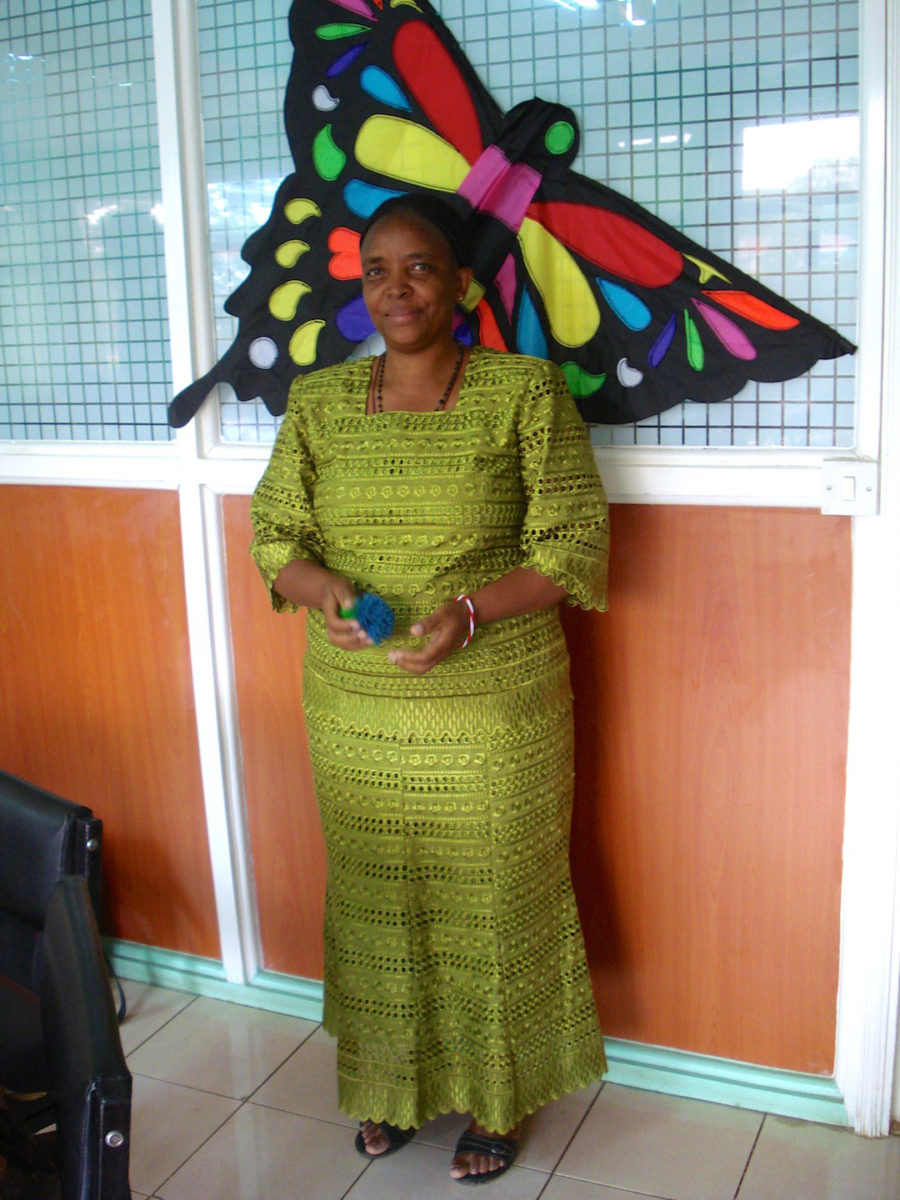 One East Asian Muslim woman who was in class yesterday was not there today because she was graduating. She (Firdaus Hamza) sent me a photo, explaining that it was an interesting experience to get her degree with two small children. I’ve attached the photo, just for fun.
One East Asian Muslim woman who was in class yesterday was not there today because she was graduating. She (Firdaus Hamza) sent me a photo, explaining that it was an interesting experience to get her degree with two small children. I’ve attached the photo, just for fun.
Tomorrow I begin my sightseeing adventures. I expect to have lots to tell and to show you!
P.S. It rained cats and dogs last night, thundering very loudly. There were large puddles on the streets this morning. But today must be in the mid 70’s with bright sunny skies and nice breezes. I see that Madison temperatures are very very frigid, with snow on the way. I’ll try to send you warming photos.
Nairobi, Saturday, December 7
Hello.
I’m going to tell you about my adventures today in Nairobi. My next message will tell you all about my adventures in Nakuru National Park on Saturday, December 8th.
The first photos attached show a cactus that most of us just grow indoors- and the flowers in the window boxes outside very window of t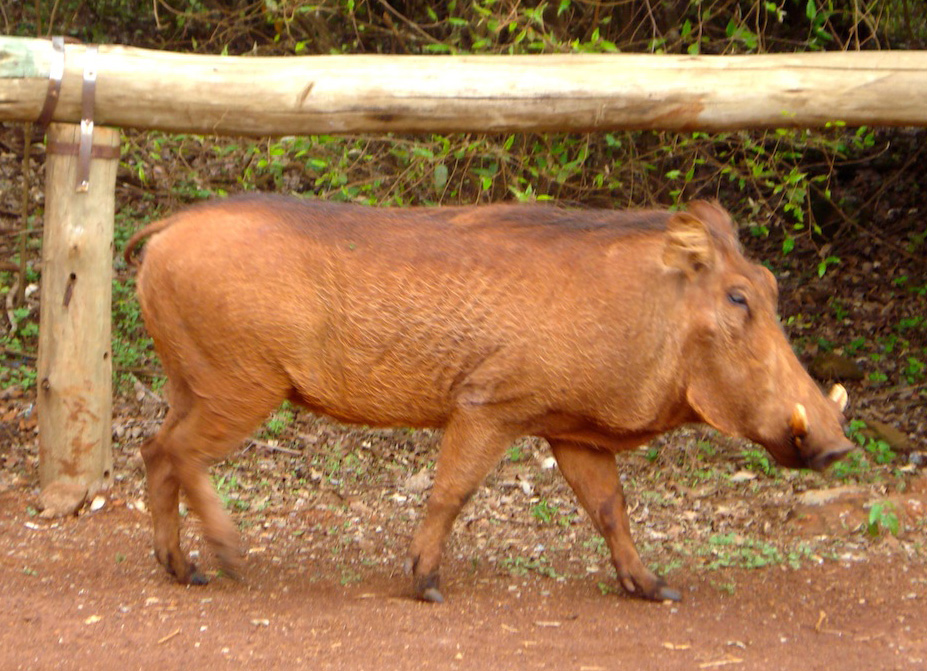 he Nairobi Serena Hotel. Have you ever seen window boxes at other hotels?
J
he Nairobi Serena Hotel. Have you ever seen window boxes at other hotels?
J
ames picked me up at 9:30 a.m. and as we were driving, I noticed huge birds on top of trees and signs. These were Marabou Storks- and clearly the prehistoric-looking bird I mentioned seeing earlier.
As we were waiting to dart into traffic, there was a man in a wheelchair asking for money. James gave some to him, explaining that this man could not work or make any money, so he had to rely on those who could. There is no provision for the disabled.
When we got to the Baby  Elephant Orphanage, a curious Thompson’s gazelle and a family of mother, father and baby warthogs trotted right by the car.
Elephant Orphanage, a curious Thompson’s gazelle and a family of mother, father and baby warthogs trotted right by the car.
We got there more than an hour before it opened, because it is only open for one hour (11-12)
and people arrive as soon as they can to be able to park.
The one-hour limitation was explained: they don’t want to disrupt the elephants’ schedules and they also don’t want the elephants to spend much time w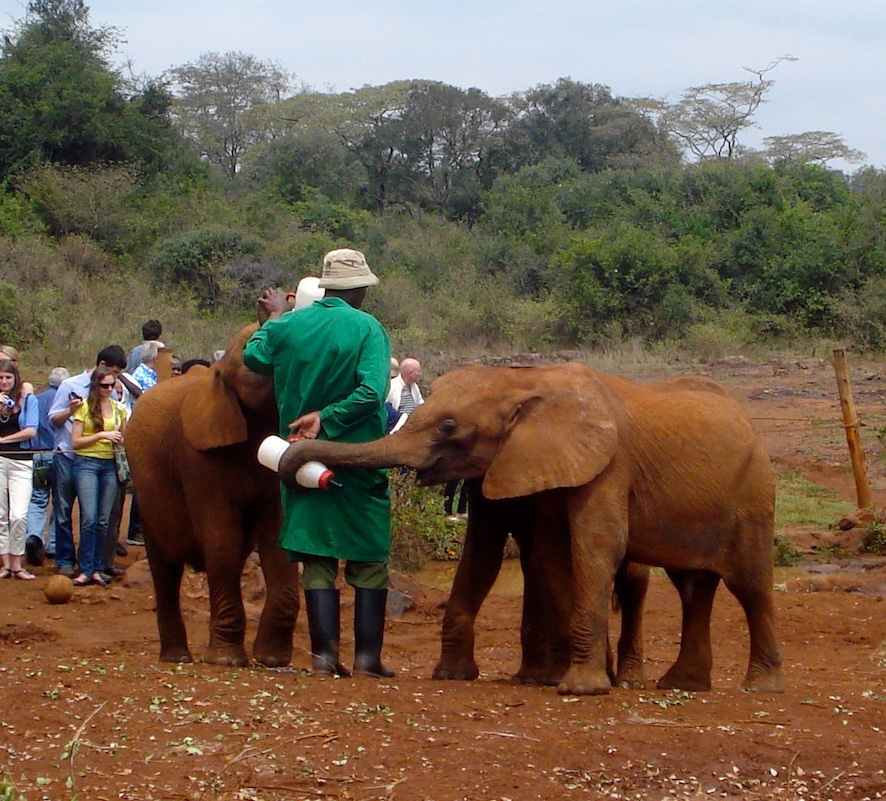 ith humans, since the intent is to send them back into the wild.
I met three women from the states, one actually from Waukesha. All three were teachers with Christian Ministries, two in Nairobi and one in Tanzania. Becca is in Tanzania with her husband to teach a three-year immersion course in African culture in small villages, the language, food, customs, how to make friends, etc. to American students there to do mission work. They live as the natives live. In the second year, they have a community development project. By the time they finish, they can go live anywhere in Tanzania to continue the work there.
ith humans, since the intent is to send them back into the wild.
I met three women from the states, one actually from Waukesha. All three were teachers with Christian Ministries, two in Nairobi and one in Tanzania. Becca is in Tanzania with her husband to teach a three-year immersion course in African culture in small villages, the language, food, customs, how to make friends, etc. to American students there to do mission work. They live as the natives live. In the second year, they have a community development project. By the time they finish, they can go live anywhere in Tanzania to continue the work there.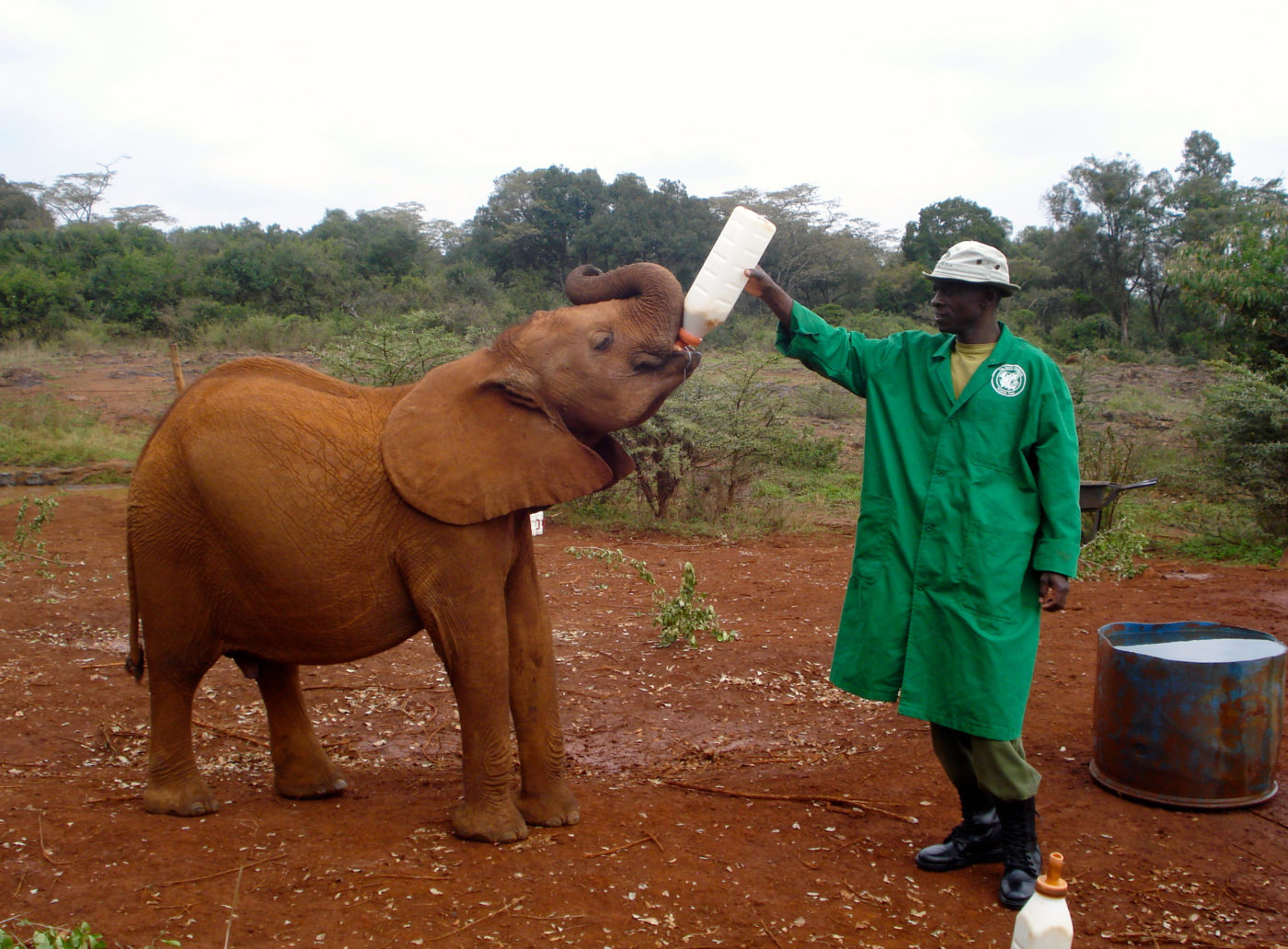
Becca and her husband have three children, one of whom was born in Tanzania- and all lived there for many years before going back to the states 10 years ago. Now they are back to help the people the best way they can. Okay, now on to the baby elephants. I’ve attached a number of photos. The first 15 elephants were a few months old to 2 years. They are fed huge 1-liter baby bottles of a vegetable-base baby formula very 3 hours around the clock. We watched them slurp their bottles, drink water, play with each other, and eat leafy branches. We were also able to pet them! Although they were all babies, the oldest of the babies- maybe 2 years old in this case, assumes responsibility for caring for the others and leading them. We were told not to kneel because then the elephants would think we were toys and try to kick us. I don’t know if you can tell from the photos, but there was only a rope between the elephants and onlookers. We learned that they are orphaned primarily due to poaching.
Elephants also smell the water in sun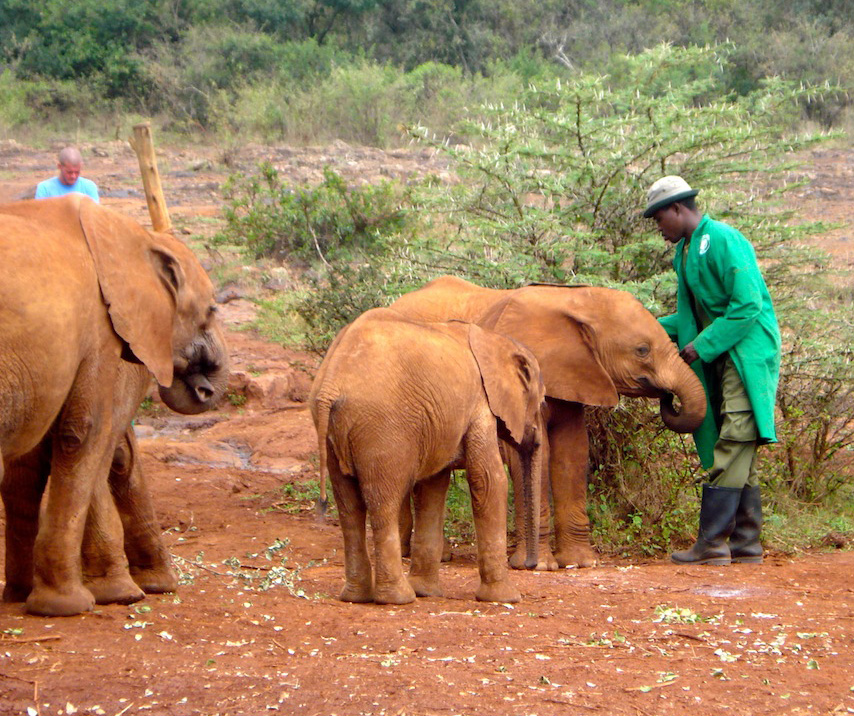 ken water pipes and the babies fall into the pipe and can’t get out. With these littlest ones and other babies 2-5 years old, there were 30 of these orphaned elephants- and the numbers are getting higher.
Once the littler ones were led off, the older ones came. They knew how to hold their bottles (they got two) themselves. They also tried to steal bottles from the handlers as they were feeding another elephant. Many of these older babies had tusks, which emerge when they are about 2 years old. They are fed every 6 hours around the clock.
The baby formula milk is not their sole source of nutrition, because they eat roots and branches in the park.
All of the elephants in my photos look brown because they have been rolling in the red dirt. They are actually gray.
The focus of this place is to help the elephants go back into the wild. When they are about 3 or 4, they are moved to a park that has elephants and gradually introduced to the herd. 60% of the orphans are successfully “adopted” by the herds.
ken water pipes and the babies fall into the pipe and can’t get out. With these littlest ones and other babies 2-5 years old, there were 30 of these orphaned elephants- and the numbers are getting higher.
Once the littler ones were led off, the older ones came. They knew how to hold their bottles (they got two) themselves. They also tried to steal bottles from the handlers as they were feeding another elephant. Many of these older babies had tusks, which emerge when they are about 2 years old. They are fed every 6 hours around the clock.
The baby formula milk is not their sole source of nutrition, because they eat roots and branches in the park.
All of the elephants in my photos look brown because they have been rolling in the red dirt. They are actually gray.
The focus of this place is to help the elephants go back into the wild. When they are about 3 or 4, they are moved to a park that has elephants and gradually introduced to the herd. 60% of the orphans are successfully “adopted” by the herds.
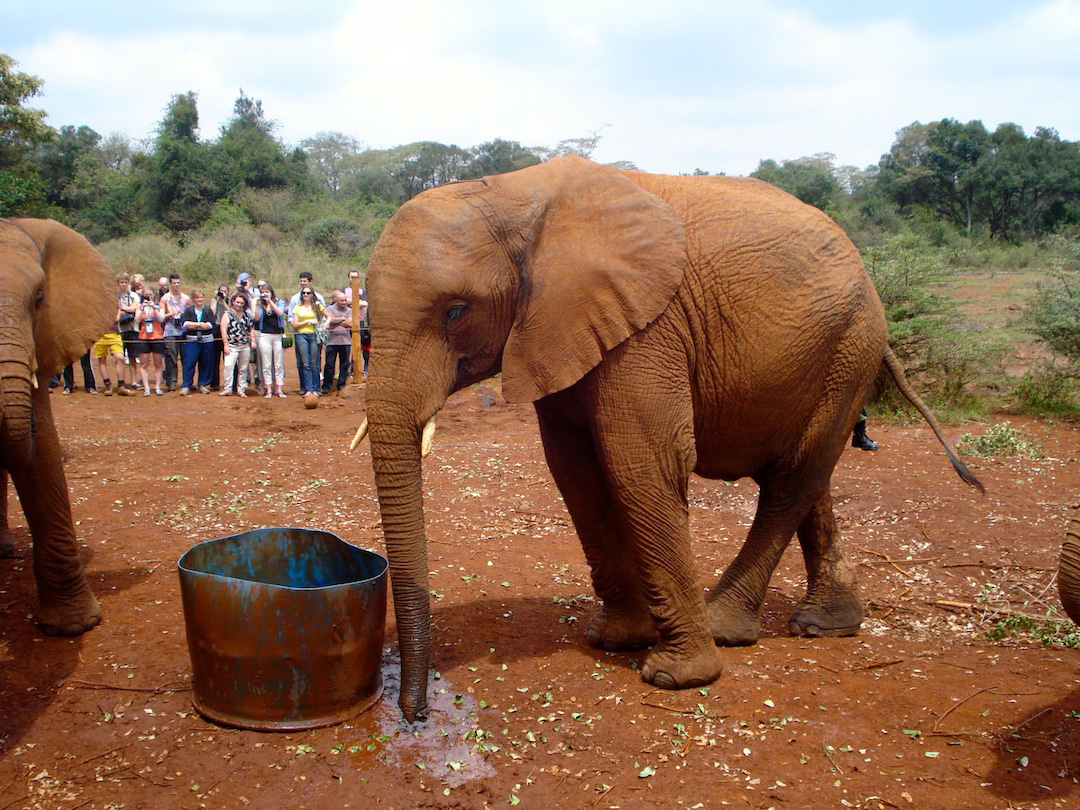 Elephants grow 6 sets of teeth, 1 set every ten years (because they get worn down from eating branches and roots. When the 6th set is worn down, the elephant dies from starvation.
It costs $900/month to feed each elephant, so they rely on donations. People who are able to donate $50/month in order to adopt one of the elephants (they all have names and were introduced to us), you get weekly updates on your elephant, plus photos and handlers’ notes.
They also have two orphaned black rhinos. One is half wild so returns on his own schedule. The other is blind (they operated and discovered he was genetically blind) so he has his own area and no one is allowed to see him, because the noise frightens him.
Elephants grow 6 sets of teeth, 1 set every ten years (because they get worn down from eating branches and roots. When the 6th set is worn down, the elephant dies from starvation.
It costs $900/month to feed each elephant, so they rely on donations. People who are able to donate $50/month in order to adopt one of the elephants (they all have names and were introduced to us), you get weekly updates on your elephant, plus photos and handlers’ notes.
They also have two orphaned black rhinos. One is half wild so returns on his own schedule. The other is blind (they operated and discovered he was genetically blind) so he has his own area and no one is allowed to see him, because the noise frightens him.
On the way to our next stop, we drove through Karen, which is where the ministers of state, cabinet officials and wealthy business owners live in lovely homes on streets with tall groomed hedges of flowering shrubs. Just lovely.
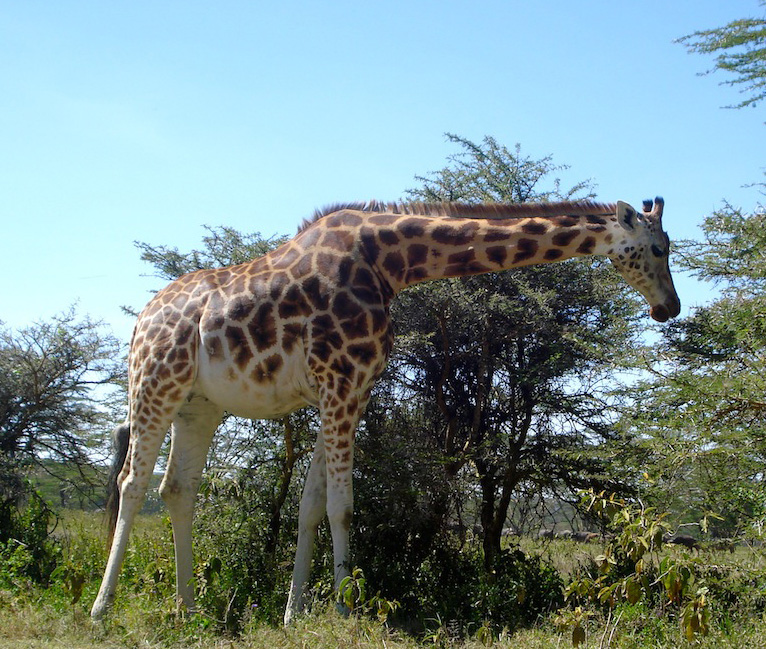 We next drove to the giraffe refuge, where I got to feed pellets to Ed the giraffe. His tongue was long and his mouth was gentle. What a treat!
We drove to the next part of my Nairobi adventure along a road that had an open market of wood and metal furniture and sculpture on one side and nurseries with flowers, plants, trees, and vases on the other side. And, walking right along was a small herd of sheep, all alone. They trotted across the street. We had noticed a Masai woman and child and James thought that the sheep probably belonged to them.
We next drove to the giraffe refuge, where I got to feed pellets to Ed the giraffe. His tongue was long and his mouth was gentle. What a treat!
We drove to the next part of my Nairobi adventure along a road that had an open market of wood and metal furniture and sculpture on one side and nurseries with flowers, plants, trees, and vases on the other side. And, walking right along was a small herd of sheep, all alone. They trotted across the street. We had noticed a Masai woman and child and James thought that the sheep probably belonged to them.
Our next stop was Kazuri. Years ago, when my folks went on safari in Kenya and Tanzania, they brought me back a beautiful necklace of clay birds in different colors. The place they purchased them had been set up to provide employment for women who had been abandoned by their husbands and had no way to support themselves or their children. In this place, they learned how to make clay, mold it into different shaped beads, paint them, and create jewelry. I have never been able to find earrings to match my necklace and Mom had hoped I would be able to find the place again. Well, the place was and is Kazuri! It began with 2 women workers back in 1975 and one of those women still works there today, when there are now 340 ladies working there. They make the beads from clay taken from Mount Kenyatta. Each woman makes 900-1000 beads per day! They export 50% of their jewelry and pottery all around the world as part of World Fair Trade. Unfortunately, they no longer make the bird beads. However, the ladies in the shop were able to help me find earrings that would match nicely, so I am now all set! I also had to purchase earrings to bring home for family and friends (☺). What is amazing is that the earrings were 350 KS, about $4!
Next, we went to the Masai Market. Open air, filling a complete city block, with blankets laden with sculpture, jewelry, fabric, kitchen utensils, batiks, on and on. When you walk into the market, two men come to take you around, one to show you wares and the other to put them in a bag. When you are done, you sit on small wood stools to bargain over prices for each. Luckily, James was there to advise me when they should give me a “discount.” I am absolutely thrilled with my purchases, which would have cost 3-4 times as much in a gift shop. It was a great experience, except for the young girl wearing a nice dress who kept following me around asking in a plaintive tone for money. Thus ends the story of my adventures in Nairobi. Now I’ll tackle describing the 11 hours of my Nakuru adventure.
Nairobi, December 8
Hello.
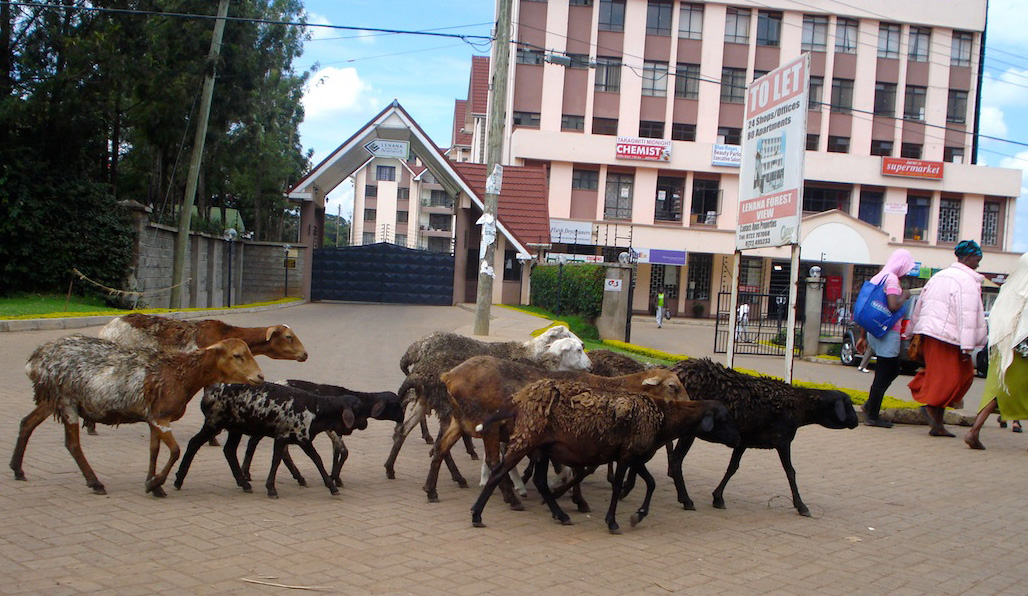 As we drive from the hotel out of the city, we pass markets and shops made of rusted corrugated metal shacks; large herds of sheep, cows, or goats in the hundreds graze along the roadside; bicycle and motorcycle “taxis;’
As we drive from the hotel out of the city, we pass markets and shops made of rusted corrugated metal shacks; large herds of sheep, cows, or goats in the hundreds graze along the roadside; bicycle and motorcycle “taxis;’
Please join me on the Great North Road, built 1939-1945, that connects Cape Town with Cairo. It is clogged with huge trucks carrying loads from the port city of Mombasa to landlocked Uganda and Burundi. There are baboons along the roadside; a zebra standing in a field; carts being pulled by donkeys or by men; a veiled woman on the back of a motorcycle, her colorful veil streaming behind her; a little boy rolling a hoop; people walking what appears to be miles away from anywhere.
James weaves in and out of the lanes, judging when to pull back into his lanes when oncoming traffic appears. We seem to be moving at a great speed. When I ask him about it, he says that he can only go 110 kilometers/hour (equal to about 70 mph); minibuses and vans are limited to 80 and trucks are limited to 65.
He tells me about the three major tribes in Kenya: the Masai, who are nomadic herders; the Luo who fish; and the Central Kikuyu who farm and do animal husbandry.
As we drive through areas, he tells me what they are known for. For example, people go to Kikope for roasted meat and to Lake Elementaita to get large bags of soda ash for white washing.
On this journey, we will move through cities and very small towns, forests, arid areas, mountain areas and lake areas. The countryside is continually changing. Some small towns have signs for Rotary Club and a woman’s bank; all have churches and missions and church schools.
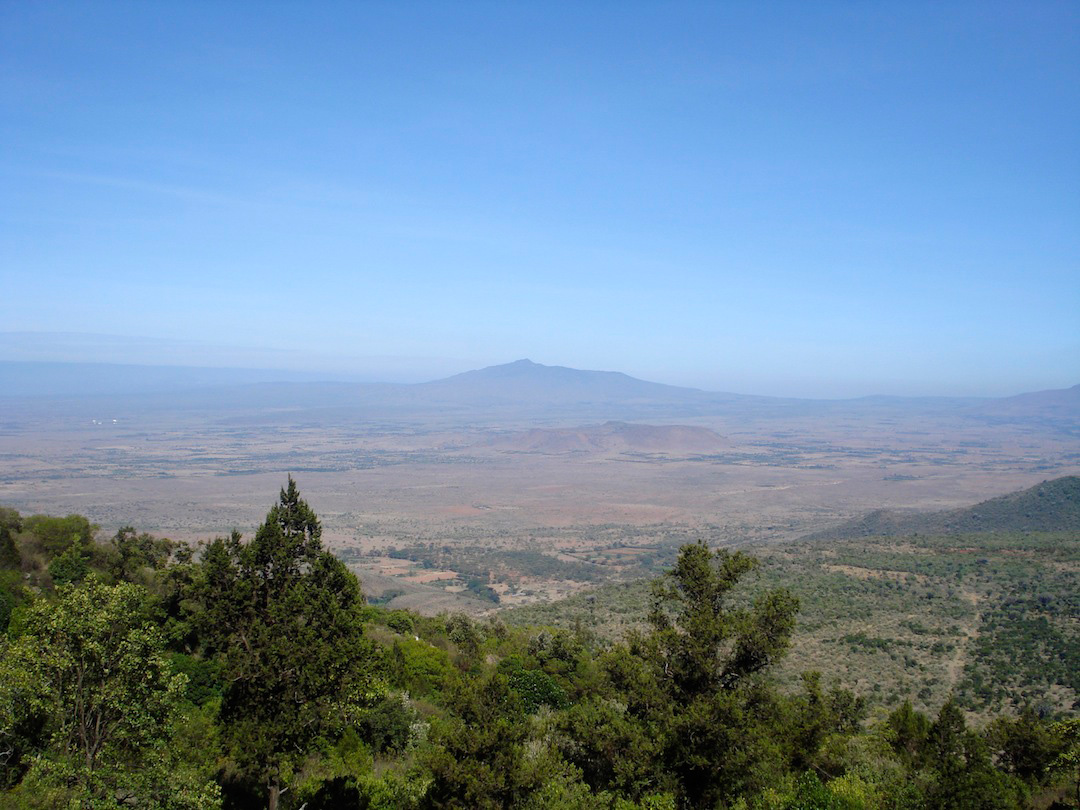 We stop at a lookout point for the Great Rift Valley, where I am told that it extends 8,600 miles from Jordan to Cairo and is 60 miles wide. An international satellite station is pointed out, which triangulates with stations in South America and Australia (although later I can’t confirm this on the internet). Our guide there points out Mount Longonot, which is active. I later purchase products he has made from the lava.
We stop at a lookout point for the Great Rift Valley, where I am told that it extends 8,600 miles from Jordan to Cairo and is 60 miles wide. An international satellite station is pointed out, which triangulates with stations in South America and Australia (although later I can’t confirm this on the internet). Our guide there points out Mount Longonot, which is active. I later purchase products he has made from the lava.
We pass where the great wildebeest migration occurs near Masai Mara from July through September.
It takes us 2.5 hours to get to Nakuru. The park at Lake Nakuru presents a number of surprises. The first is that there are many trees and buildings under water. The lak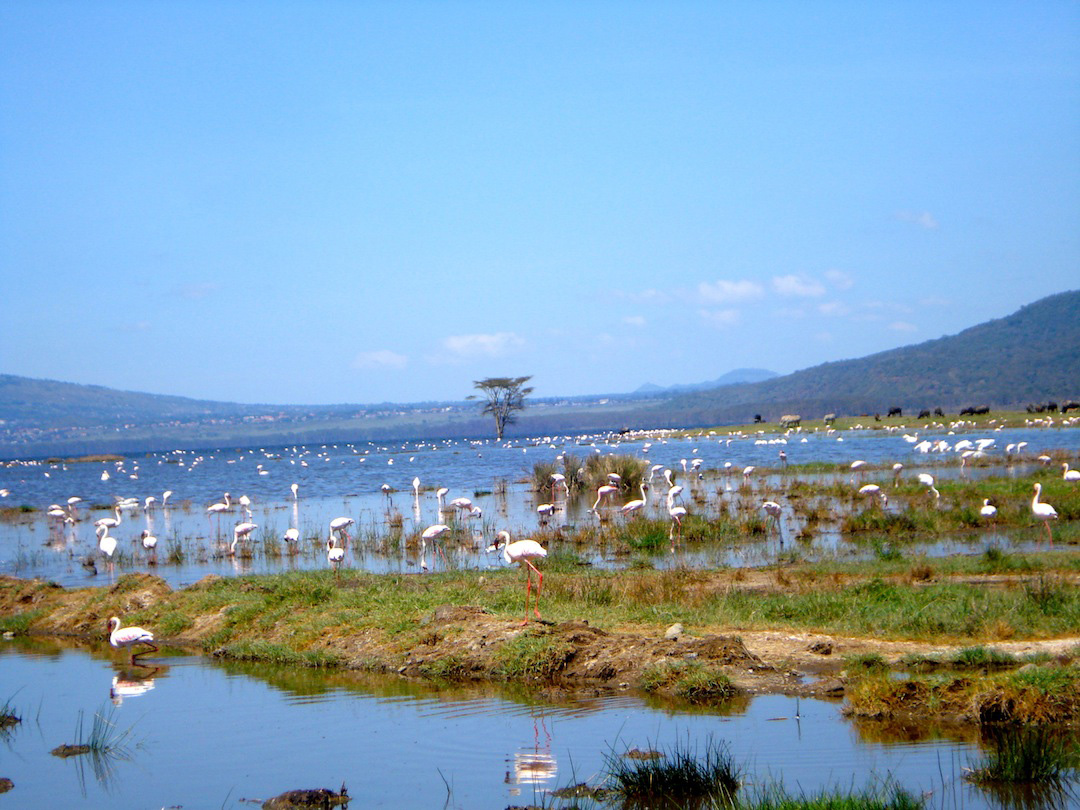 e, which usually is 45 km wide, is now 65 and climbing- due to heavy rains, four “seasonal” rivers flow continually into the lake. Roads have been washed away and new roads quickly constructed.
e, which usually is 45 km wide, is now 65 and climbing- due to heavy rains, four “seasonal” rivers flow continually into the lake. Roads have been washed away and new roads quickly constructed.
When I ask our guide if Kenya could divert the rivers, he tells me that it is against the law to go against nature- people need to get out of nature’s way.
Nakuru is known for its 1.5 million flamingoes, but flamingoes like salt water. Because of the influx of fresh water, the flamingoes are starting to move elsewhere.
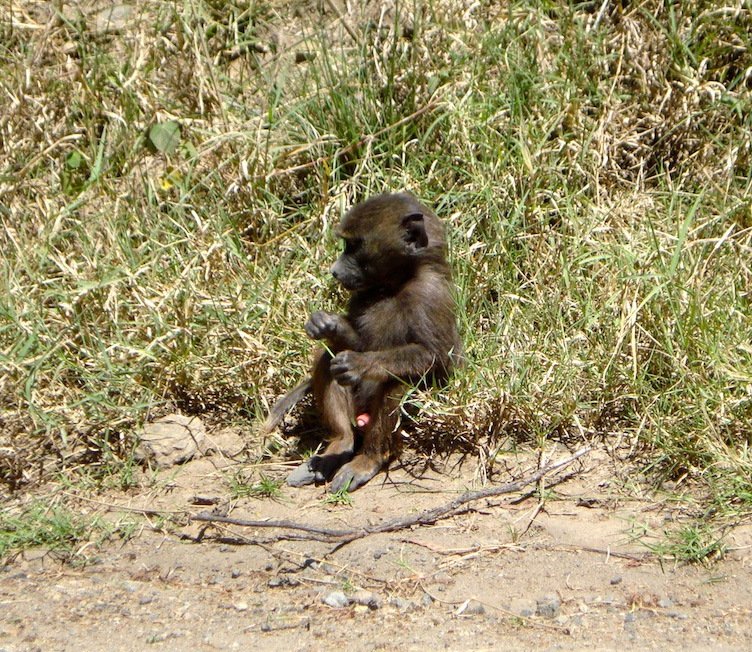 The animals here include: Thomson’s and Grant’s gazelle, colbus monkey, hippo, leopard, lion, rhino, waterbuck, impala, gazelle, striped hyena, wild cat and the endangered Rothschild’s giraffe.
The animals here include: Thomson’s and Grant’s gazelle, colbus monkey, hippo, leopard, lion, rhino, waterbuck, impala, gazelle, striped hyena, wild cat and the endangered Rothschild’s giraffe.
They do not have: elephants, because they are very destructive; cheetahs, because it gets too cold for them; or wildebeests, because they do not like enclosed spaces.
They began with 55 lions but now have over 72- and almost all of them have been hurt battling each other to maintain their areas. The park will be shipping 25 out to other parks.
There are 450 species of birds- and during the course of the day, we probably see over 100. The flamingoes go to Tanzania to lay their eggs because the soil in Nakuru is too soft for them to make their nests of mud.
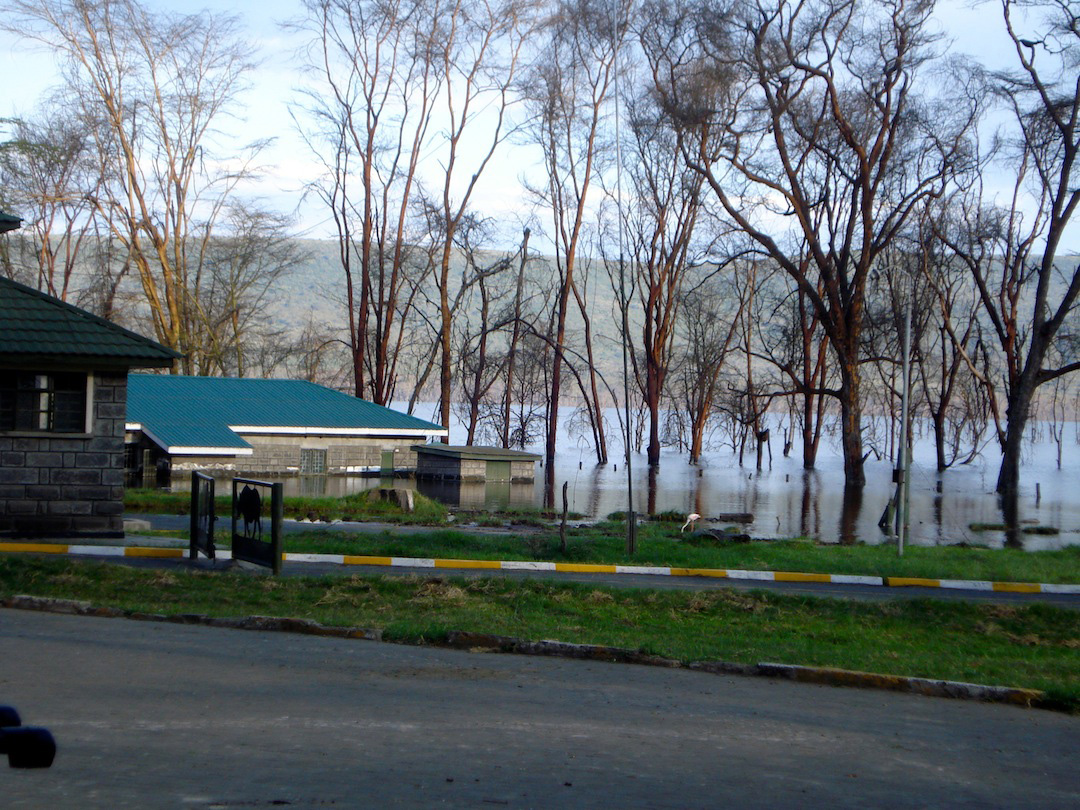 We see guinea fowl and our guide tells us that their eggs are highly prized, particularly by the Chinese. One egg sells for 160,000 KS. Later, we learn that the guinea fowl lay their egg (1 every other year) make a communal nest, which all sit on.
We see guinea fowl and our guide tells us that their eggs are highly prized, particularly by the Chinese. One egg sells for 160,000 KS. Later, we learn that the guinea fowl lay their egg (1 every other year) make a communal nest, which all sit on.
As we drive through the forested area, we see all sorts of brightly colored small birds and gazelles. Each herd of gazelles has one male and after 2-3 years, another male fights him to take over the harem. Once a male gazelle reaches maturity, he is run out of the herd and lives with other bachelors- until he possibly gets a crack at leading the herd. Many of the males, however, never do. The mothers tell their young what to do by how they hold their tales. If the tale is up, it means to follow. If the tale is down, it means to take cover.
We also see lots of zebras, each of which has its own unique marking the same way we have unique fingerprints. There are two types of zebras and this common zebra has stripes under their bellies, while the other type does not.
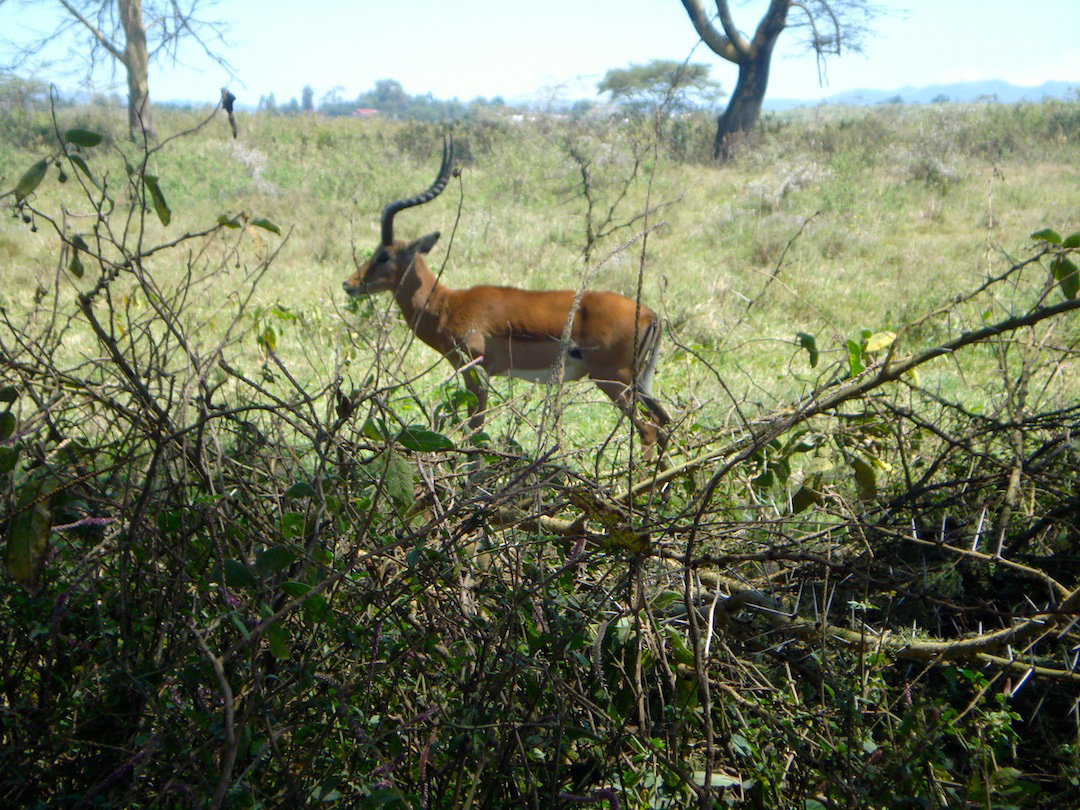 When we get within sight of the lake, we see all sorts of water birds. We also see (and smell) a dead water buffalo being attended to by a vulture. There are waterbucks everywhere.
When we get within sight of the lake, we see all sorts of water birds. We also see (and smell) a dead water buffalo being attended to by a vulture. There are waterbucks everywhere.
When we get to the savanna, we look for lions- but see none. However, the day before the guide tells us that there were 7 lionesses sleeping in the shade of a tree next to the road! There are yellow barked acacia trees- as soon as I saw them, I remembered their silhouette in promotions for the movie Out of Africa. They look flat on top. When you see my photo, I’m sure you’ll recognize them. Later, as the sun started to go down, the light played up the yellow in the trunks.
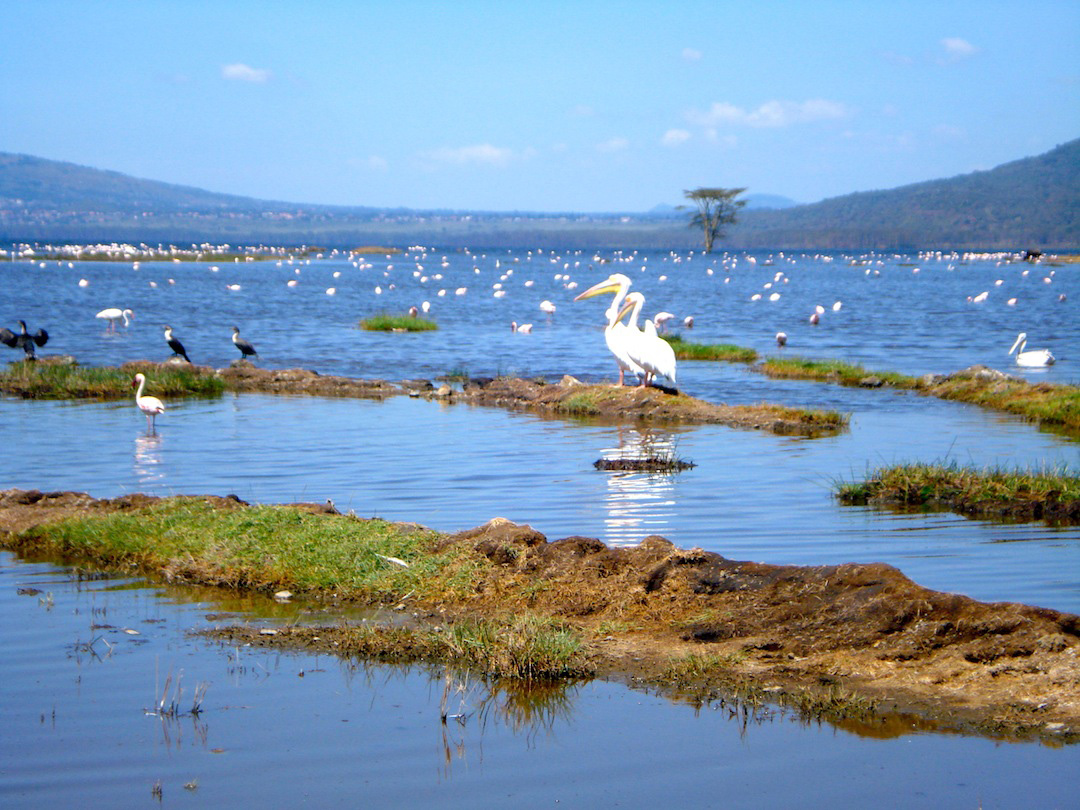 When we get to the lake, I can’t believe my eyes. There are thousands of flamingoes- some with red legs and beaks, others with red on their wings. We watch one flamingo right next to us ground his beak into the mud and rub his beak back and forth, taking in algae and discarding what he doesn’t want.
When we get to the lake, I can’t believe my eyes. There are thousands of flamingoes- some with red legs and beaks, others with red on their wings. We watch one flamingo right next to us ground his beak into the mud and rub his beak back and forth, taking in algae and discarding what he doesn’t want.
There is also a large flock of Great Pelicans- and water buffalo everywhere. It is breathtakingly beautiful and so peaceful. I could have stood and watched the birds for hours.
There are so many water buffalo that the park will give them away to any zoo or park that will pay to transport them.
When we leave, we pass lone male water buffalo, matted with mud and looking very forlorn. When they get to about 15 years old, they are pushed out of the herd. Since they live for another three years, it is a very lonely existence. They cover themselves with mud to keep the parasites and ticks off. They are the most dangerous of animals.
The next surprise is a Rothschild’s giraffe eating acacia leaves. These giraffes are white from the knee down, so it looks like they are wearing white socks. They are the only giraffe with 5 horns. They have very long tongues (45 cm) and their saliva is antiseptic. This is useful, because the acacia have 1” long thorns.
Their legs are solid bone, without any marrow, so one kick can kill a lion. They have the largest heart of any animal to pump blood up their long necks. They only sleep 5-30 minutes because they have to be alert against predators.
We see baboons and velvet monkeys. The velvet monkeys are very cute and small enough to be the prey of the fish eagles.
We don’t see hyenas, but we are told that they will come to eat the dead water buffalo that night. 70% of hyenas do not hunt, they just live on what they find.
T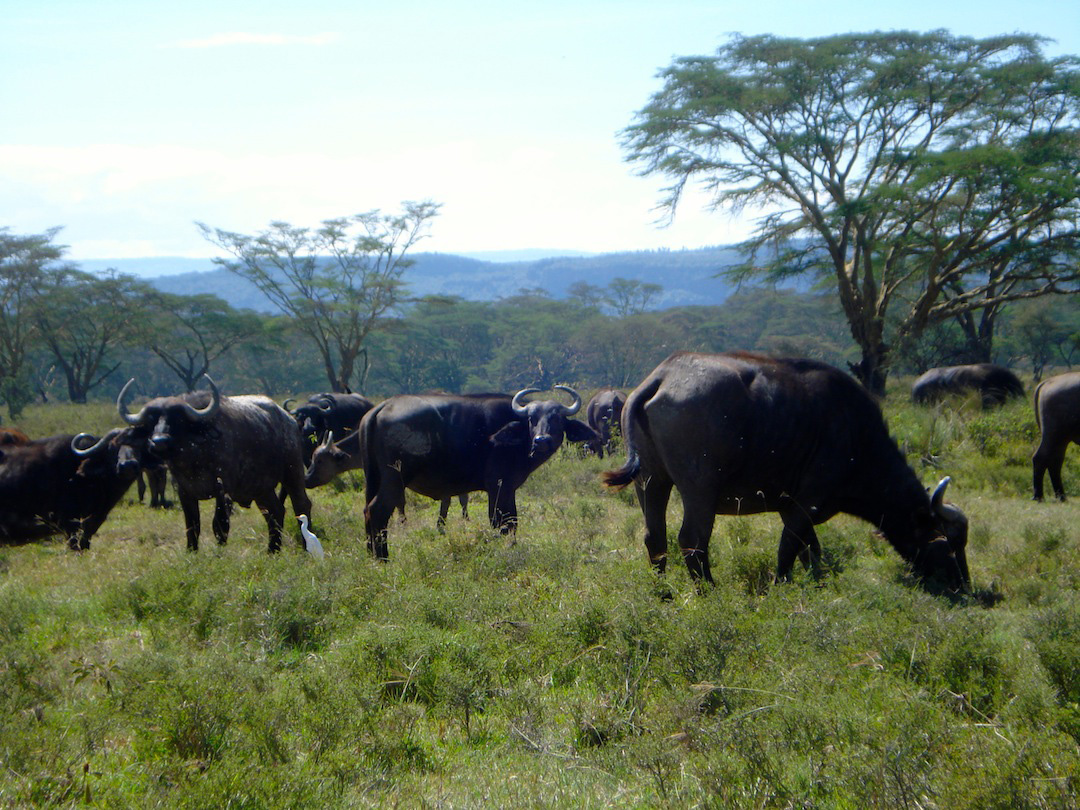 here are white rhino, who have no predator, because their hide is thicker (1.5 inches) than a lion can bite. Their horns are 7-8 kilograms- and 1 kilogram goes for 700-800 KS. People believe that the horns give them energy. They let a horn rot, then crush it and put a pinch into what they eat.
here are white rhino, who have no predator, because their hide is thicker (1.5 inches) than a lion can bite. Their horns are 7-8 kilograms- and 1 kilogram goes for 700-800 KS. People believe that the horns give them energy. They let a horn rot, then crush it and put a pinch into what they eat.
Our guide showed us the enormous nest of small bird called a hammerkop. It takes 3 years to build it and it can weigh up to 200 kg.
We went to Makalia Falls, which was very nice. There were trees with pink flowers. Apparently, what I saw was called red lily and was a parasite.
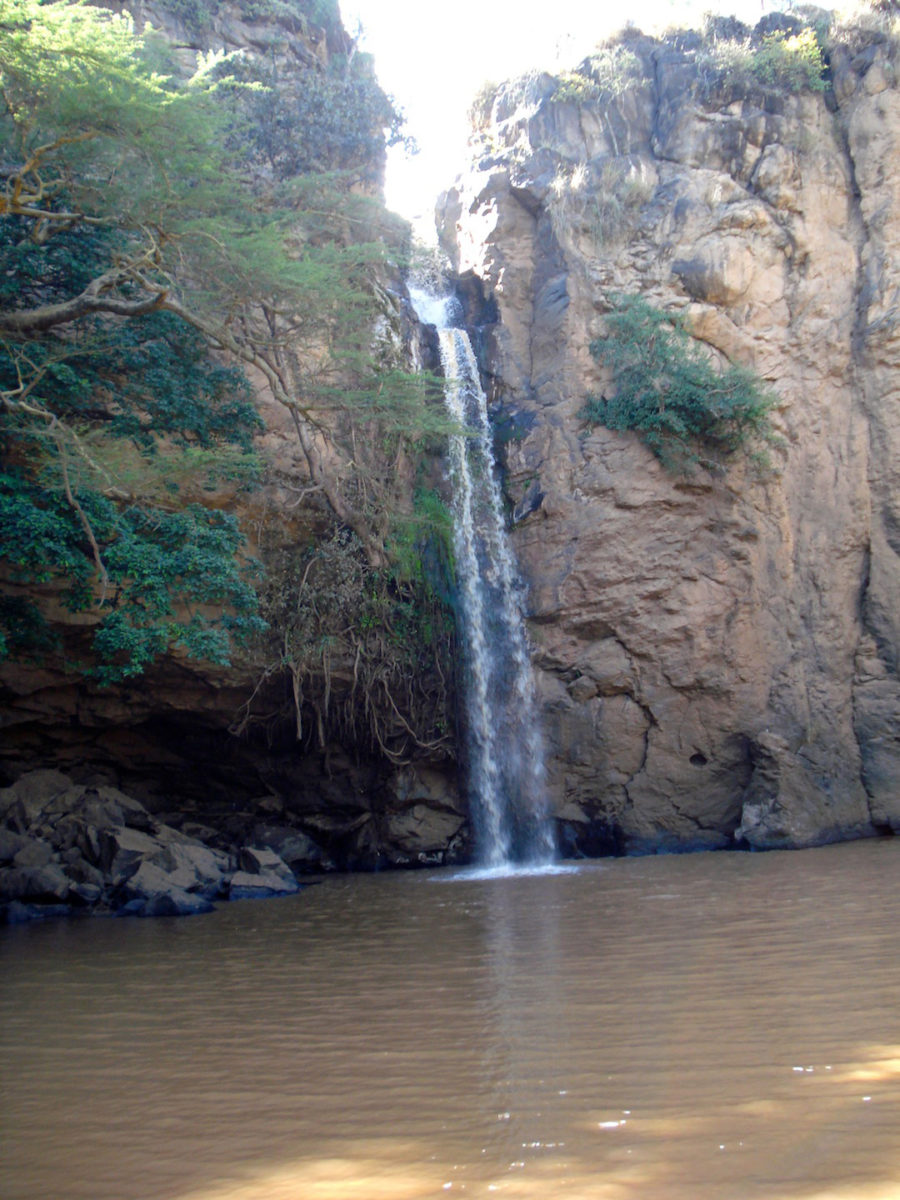 Rather than try to list all of the birds we saw, it probably would be easier (for both of us) if you just Googled Kenyan birds and you’ll see what they look like. But here is a partial list:
Rather than try to list all of the birds we saw, it probably would be easier (for both of us) if you just Googled Kenyan birds and you’ll see what they look like. But here is a partial list:
Sacred ibis, marabou stork, yellow-billed egret, black-headed heron, greater flamingo, lesser flamingo, Egyptian goose, gray crowned crane, augur buzzard, black kite, cormorant, teal, crowned plover, black smith plover, common sandpiper, lilac-breasted roller, little bee-eater, red-billed hornbill, Jackson’s hornbill, African blue flycatcher, gray-headed hornbill, tawny eagle, African hoope, great white pelican, African fish eagle, greater painted snipe, hammerkop, African spoonbill, guinea fowl, common greenshank, etc.
When we finally got back to the hotel 11 hours later, I was astounded by what sounded like millions of birds at the hotel entrance. They were frogs!
Nairobi, December 9
Hello.
After a perfectly lovely weekend, the workweek began with rain. Driving to the training location, there were huge muddy puddles. I would have thought that a place prone to heavy rains would have a better drainage system.
Paul was the only participant for the first half hour, so we had a great discussion. He told me that during the dry season, they do not clear the drains of the dirt and plastic bags that wash into the drains and clog them.
This led to his statement that Africa’s problems are small and easily resolved. It’s just that, due to graft and corruption, the problems continue.
He mentioned that lots of funds come from the US and other international donors, but they do not get to the groups that they are supposed to help. And because the international donors are not unified so that they speak with one voice, they have minimal impact on ensuring that the funds get where they should get.
I asked him about what, if any, provisions there were to help disabled folks survive- and his answer was, none. That there is no affirmative action to assist marginalized groups, the disabled or women to get jobs. However, he mentioned working for one organization that had a terrific blind receptionist- and when that person retired, the owner insisted that another blind person be hired to fill the job.
We also discussed the dearth of doctors. According to Paul, the doctors teaching medical students do everything that they can to thwart them from getting their MBAs so that they can set up shop. This is done because they don’t want the competition. However, there is really a crying need for doctors.
Kenyan doctors also leave for other countries because there is no job progression in the larger hospitals and many hospitals lack the equipment and facilities to enable the doctors to use their skills.
Other participants dribbled in so that at one point we were up to 9, then one left, then 2 came- and one came in just after the class ended! She still took the pre-test, which we discussed so I could catch her up on the content. She vowed to find a hotel closer to the training site so that she could be early tomorrow.
I know that my descriptions from my weekend adventures indicated how much I enjoyed them. Let me give you another side of my experience that is less wonderful.
- There was no power, so once again, I had to climb the stairs in the dark.
- I couldn’t use the restroom because there was no water.
- My 1:30 pick up did not get there until after 2:30, because of huge traffic jams.
- I was hungry, needed a bathroom like nobody’s business, and I got tired just standing and waiting and waiting.
- Finally, James called to give me his eta- which was another 20 minutes.
- I started pacing, just for something better to do- and finally noticed a woman braiding the hair of a little 4-year-old girl in one of the 4 salons on the first floor.
- Someone saw me watching and invited me in. They were so kind, they let me just sit there (aahh) and watch.
- The stylist had the patience of a saint and her fingers were so deft and so quick that I could not see how she was making these tiny braids close to the little girl’s head. I would say that the braids were probably 1/8 “.
- When I thought James might be coming, I thanked them profusely and went again to stand- and wait and wait and wait.
- Yes, the traffic was absolutely terrible.
- Although tired, hungry and needing a bathroom, I told James that we needed to go to the supermarket so I could replenish the candy supply.
- After that, it took about 30 more minutes to reach my hotel- which was surrounded by men with rifles because some high level person was meeting at the hotel.
- This meant that I had to get out of the car and walk, carrying the heavy bag of candy, my very heavy laptop case and my purse.
- It was extraordinary, how many cars and military personnel were there- with red carpets laid out everywhere.
- On another day, a porter would have helped me with my packages. However, today they were all focused on being available to the statesman (I’ll probably read about who it was in tomorrow’s paper).
- By the time I got to my room, I was a hot exhausted wreck.
- I took a shower, washed underwear in the sink, and ate an apple and an orange, plus some crackers with peanut butter.
- I have a pinched nerve that acts up (and has been acting up for the past 4 days). So, I lay down to read and rest my back at 5 p.m.
- When I heard fanfare downstairs, I raced to the window to see if I could watch what was happening, but it was outside of my range of vision. Clearly, it was pomp and circumstance and I’m assuming it was for the President!
- I was so exhausted, I set my alarm for 7:30 p.m. and went to sleep.
- When the alarm woke me, I went back to sleep.
Now, here is the hysterical part. I was awakened by someone knocking on the door. It was housekeeping. When I asked what time it was, the man said it was a quarter to nine. [Note: I have overslept twice in my life when I was supposed to be training- and each time it was housekeeping that awakened me.]
I went into hysteria mode because I thought he meant 9 in the morning- and I should have been awake and ready to go by 8 a.m. I flew to wash up, get dressed and get out the door (no makeup, no jewelry) with my purse, heavy laptop and heavier bag of candy.
There was no time for breakfast.
When I got downstairs, I heard the peepers and realized that it was night!
I felt foolish, relieved, and upset, all at the same time.
To say that I am absolutely exhausted would be an understatement.
Tomorrow, I plan to pack some fruit because I absolutely cannot continue to have my lunch at 4 or 5 p.m.
I uploaded photos from the day and prepared to email them to the participants, but the system crashed and I had to upload the 10 photos one by one all over again. I’m embarrassed to say, but I was so tired and frustrated I cried.
Then I wrote up my report on the module.
I ended up having a dinner of soup at 10:30 p.m.
And now I’m writing to you.
So, that is the flip side of this adventure. If I drank coffee or soda with caffeine, I suppose it might be easier on me in the short term. But I don’t and I won’t.
Bottom line, international travel and training facilitation for days on end, particularly with a bad cold, pinched nerve and the simple fact that I’m not as young and resilient as I used to be, can wear down even the hardiest of souls.
I’m going to end this letter, prepare for tomorrow, and get to bed. I’ve set my alarm and asked for a wakeup call.
Tomorrow is another day. The participants are wonderful, the training is going well, James does his best to take care of me, and I have a warm meal in my tummy. I’m sure the sun will be shining. And I’ll see what I can learn from each experience.
Nairobi, December 10
Hello. I had a good night’s sleep, woke up with my alarm, had time to dress and have a leisurely breakfast. There was no repeat of last night’s fiasco, thank goodness!
I did end up tipping over my plastic glass of water on the table with all of my materials. With no towel or paper towel or paper napkin available, I sopped things up with Kleenex and toilet paper (neither good substitutes for the former unavailable materials).
There was electricity and by 9:30 there were 6 people in class, so we could start. We ended with 16! One of the participants, who came as a guest of another person, had a wonderful name: Dean Martins. How do you like that?
I discovered that the eminent person who was at the hotel yesterday was the President of Kenya. He apparently holds dinner and lunch meetings at the Nairobi Serena. This meeting was to introduce a 50 KS in honor of Kenya’s 50th anniversary. I was informed that whenever the red carpets are out, that means the President is in the hotel.
I haven’t mentioned Nelson Mandala. It is an honor to be in an African country at this time because the information, photos, retrospectives and celebrations of him are all vivid, sincere and very loving.
In counterpoint to his focus on peace and equity and justice for all, the doctors throughout Kenya (and nurses in support of the doctors) went on strike today. Yes, they walked out of their clinics and hospitals, leaving the sick and dying to tend to themselves. And why did they do this immoral and selfish thing? The government is decentralizing oversight of the government hospitals, giving that responsibility to the counties.
The government will still provide the funding for the doctors and nurses, so they won’t lose any pay even if a poor county now governs them. The issue is that many of the doctors, while being paid to work in a government hospital, often take off to make extra money consulting in private clinics and hospitals.
While the federal government oversaw their activities, there was only one man, comparable to our Surgeon General, who could make a call or come to check if the doctors were all onsite. Now, the governors of the counties will have much more opportunity to conduct random checks and ride herd on the doctors.
According to Mary, the government was currently sitting down to negotiate with the doctors. However, all agreed that the government would not back down. Given that, I asked what the government would do if the doctors refused to budge.
Melvin said that there were many doctors in Kenya who were currently without jobs, in many instances because they were not trained in Kenya. The government could just fire all of the current doctors and replace them.
However, Melvin believes that a much more likely scenario is that the doctors will make arrangements to give the county auditors a portion of the salary that the doctors make when they conduct external consulting. This way, the auditor will look the other way and the doctors will be able to continue as before. Meaning, that although they will be paid to treat the patients in the government hospitals, they will rarely be on site.
It is an absolutely dreadful situation. There is no mechanism to hold the doctors accountable.
All of this came up because our topic was how to ensure quality at every stage of a patient’s experience. The standard for quality health care service that we established was: “Is it good enough for your mother?”
The answer: in some cases, probably. In most cases, no.
The participants recounted an overwhelming number of horror stories. One in particular fell close to home, given my experience with friends. There is an oncologist who schedules all of his chemotherapy patients to come at 2 p.m. This means that some may wait over 6 hours for treatment. Some may not even get any treatment, because the oncologist will leave through a back door. I can’t even imagine how those patients must feel.
On the flip side, there is a doctor who has staff call patients to remind them of their appointments on the day before, and also an hour before the appointment to ascertain where the person is. If the person will be late, the staff sends in early patients to keep the patient flow steady and to minimize waiting time.
I really enjoy the participants, we have a nice joking relationship, I keep them supplied with candy and they work very hard, for whatever amount of time they can find to be in the class.
Now, I’m going to end this so I can get to bed at a reasonable time. ☺
Please be safe if you are faced with frigid temperatures and icy/snowy conditions.
Nairobi, December 11
Hello.
This will be very short because this has been a most uneventful day- except for a long wait to get picked up to go back to the hotel- because of traffic issues.
I just want to give you some miscellaneous notes:
When I tried to create small groups the other day, using the number of siblings the participants had, I had to give it up as soon as Paul told us that he had 44 brothers and sisters (because his father has had 5 wives- and Paul must be in his 60’s) and Ascar said she had 22 brothers and sisters! They weren’t kidding when they said that they like large families. Others had 12, 11, 10, 9 or 8 siblings. Yikes!
The electricity goes on and off quite frequently- at least 2-3 times a day.
Traffic snarls are unbelievable. Just imagine cars facing every direction caught in the same intersection. Today, people jumped out of their cars to try to direct traffic. I’ve attached some photos to try to give you an idea of the traffic situation.
Every other truck or van has some placard or stenciled message about God bless, Go with God, etc., etc.
When I chatted with the major domo this morning as I waited to be picked up to go to the training site, I told him that right now it was 3 F in Madison- which converts to -16 C. He said that when it gets to 13 C (55 F), people are too chilled to go out. When it is 77 F here in Nairobi, I’ve seen people still wearing sweaters, winter coats and hats!
Yesterday morning, during breakfast, we were serenaded by a wonderful choir singing a variety of songs, including Christmas songs. They were out on the patio.
Did I mention that the many juices available at breakfast are all fresh squeezed? I may never be able to drink bottled orange juice ever again!
Mary O, who never managed to find a closer hotel, comes after the class is over, takes the pre-test, which I grade, then we sit and I catch her up on the key content.
A tip in the free weekly Speaker Net email recommended rolling a small ball under your feet to hit the acupressure points and restore aching feet after a long day of standing to conduct training. I can testify that this actually works!
I just love Paul Oloo! He is incredibly wise and always has wonderful insights and explanations during the classes. We had a wonderful chat while waiting for our respective rides after class this afternoon. Of our many topics, he mentioned that he takes a different staff member out to eat every week, to build a good relationship and hear any issues or needs of the staff person. Afterwards, when they get back to work, he sits with the person to ask what s/he observed during the meal: the ambience, the attitude of the waitperson, the quality of the food, etc., etc.- to help the employee become more conscious of good customer service.
I took a photo of Mary in a beautiful dress. Many of the women select fabric and go to a tailor to get their dresses made.
There is also a photo from the window of the training room, to show you two women walking with bags balanced on their heads.
I’ll have all of Saturday until 7:40 p.m. to explore Nairobi before I have to leave for the airport to begin my trek home. As long as it isn’t raining (which is a big if) I may just walk around (for the first time during this trip, unfortunately, due to my illness and fatigue). I may also go to the Nairobi museum, which is supposed to be excellent.
Speaking of rain, the major domo told me that they usually have rain at night, not during the day as has happened a few days this week.
I’m very proud of myself. I am expected to expand all 22 modules into full days, adding time to existing activities, including more case studies and references, etc. Other than writing up a report of this mission, I said that I would not start work on the revisions until after the holidays. I’ve spent most of this year working 8-15 hours a day, 7 days a week, to design various curricula. I’ve traveled to Jordan, Zambia, twice to NY, and now to Kenya. I’m ready to sleep for 3 straight days, make Christmas treats, finish Christmas shopping, and enjoy my friends and family.
Tomorrow is the 50th year Jubilee. There will be cannon fire at midnight tonight to begin the celebration of 50 years of independence. I have no idea how close I am to where the cannons will be. I guess I’ll find out, if the noise wakes me up.
Stay safe and warm, all of you in snowy hinterlands!
Nairobi, December 12
Hello. Happy 50th Jamhuri Day! Today is the Golden Jubilee of Kenya’s 50 years of independence. There are banners and celebratory messages throughout the city. A man was selling Kenyan flags of every size, walking between the cars on the road.
I didn’t hear any cannon fire last night- and today dawned with pouring rain. However, midway through the class, the sun came out and we could hear singing for the next two hours.
Eleven participants came to the class, despite the fact that it is a national holiday. As a matter of fact, 6 of them were in their seats before 9:15 a.m.- which was a first in these 9 days of training!
The training topic was marketing, and everything went smoothly until… Near the very end of the session, we were assessing the various advantages and disadvantages that the participants’ organizations had in relation to their nearest competitors.
Mary, who is a devout Catholic, told us that the Holy Spirit had spoken to her and she needed to ask Paul, who works for Marie Stopes, what his organizations top services were. Apparently, #1 is providing safe abortions so that, according to Paul: (1) the women are safe and healthy and (2) they are able to have children later.
(I later learned that Marie Stopes Kenya is the country’s largest specialized sexual reproductive health and family planning organization).
Mary pointed out that abortion is illegal. Paul explained that the law would soon be changed and that women needed safe abortions.
I intervened to say that this was beyond our focus and we would be moving on to the next scheduled topic.
Mary insisted she had something to say (I assumed she meant about marketing). No, she stood up and started to advise Paul that any of the staff involved in the abortions would go to Purgatory.
At this, I talked her down and said that we needed to respect individual differences. Yikes!! Who would have imagined that discussing marketing would lead to such a controversial topic.
After that, Mary left the room for the next hour. But when she came back, just as the class was ending, she was calm and collected. Good grief!
Mary is the one who has tended to come at the very end of a session. Today, she was there two hours before the end. Kamau came 15 minutes before the end. So, I briefed him after the session.
I really wanted to go for a walk because it turned glorious (at least for a few hours). But last night, Piotr (my contracting contact for this mission) advised me not to walk alone. When I double-checked with James, he confirmed that it would be a very bad idea. So, I stayed in my hotel room.
Later, Piotr and I had a Skype conference for almost 2 hours, discussing next steps. We need case studies of real issues faced by Kenyan health practices. Since there are some wonderfully bright folks in the class who continually offer stories and examples, we are going to ask them to provide information for the case studies.
My job is now to go through all 22 modules to identify the topics and needs for case studies, create a matrix of the topics, the types of facilities, and who wants to provide the stories. I also have to create a template to guide them in providing all of the information necessary so that I will be able to create the case studies. But not tonight!
I also found out that I will be returning to Kenya to conduct a train the trainer program for whoever ultimately assumes responsibility for facilitating these business management modules for health practices.
One of the very dynamic women who conducts training for the AIDS network discussed how she is enjoying the program and knew from the moment she walked into the class and saw how the room was arranged (with kites on the walls and colorful kinesthetic objects on the tables, as well as the candy) she was intrigued. Then the content and learning activities drew her in and she couldn’t wait to come each day to see what we would do next.
The AIDS network conducts 50 training programs a year throughout the region (including South Africa, Kenya and Uganda)- and they have done this for 15 years. They may be exactly the organization we need to take over the program.
Tomorrow is the last day of training, which is somewhat bittersweet- although knowing that I will be back and will hopefully see many of these folks again is reassuring.
Each time I conduct a training program that lasts 3-5 days, or 8-10 days, whether in the states or in another country, the participants and I become a family. It is pretty wonderful. I learn and gain so much from each of them- and take a part of them with me when I leave.
True, the travel can be intense and uncomfortable- and sitting in a hotel room away from family and friends can be lonely and tiring. But all of this pales in relation to the amazing people I get to know and the beautiful and interesting places I get to visit.
Now, if only USAID had some projects in France, Italy or Greece…
Nairobi, December 13
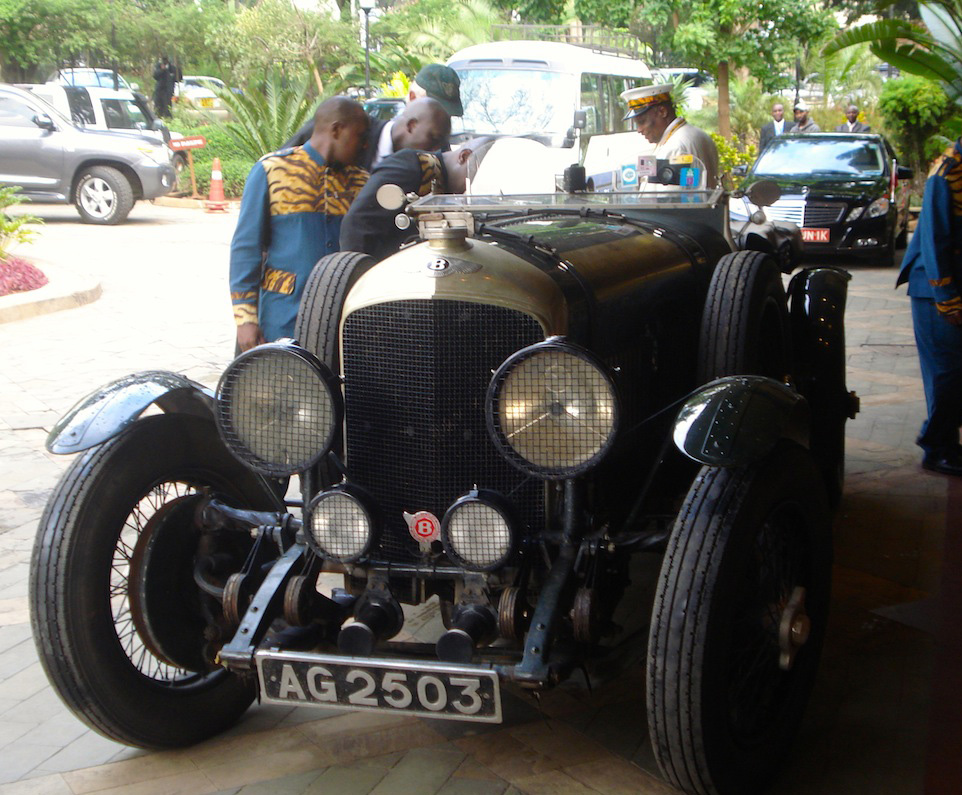 Hello. This day started with the excitement of seeing a 1927 Bentley that a Belgium couple has been driving around the world!
Hello. This day started with the excitement of seeing a 1927 Bentley that a Belgium couple has been driving around the world!
I’ve attached photos of the car, which drew a crowd of about 30 in front of the hotel as the man and woman packed up to go. I’ve also got a photo of the woman, who put on three layers of clothing as well as that helmet-like hat. Given the fact that there is no cover for the driver and passenger (and the fact that it has been raining for the past few days), her outfit is a wise one. I don’t know how they manage in the rain- I suppose they pull over under protection somewhere, but I don’t really know.
James was very late picking me up (almost 8:40 am). I spent the time talking with Joshua, the major domo, who has been very nice to me. When I can’t reach James or can’t hear what James is saying over the phone, Joshua has handled the conversations on my behalf. You’ll see a picture of him in his sartorial splendor.
There was a car parked in front of the hotel with a flag on it, which was apparently the Deputy Chinese ambassador’s car. That explains the banquet setting in the morning, when two Chinese men carefully put out chopsticks and little white holders at each place setting.
Joshua said that the President of Sudan is staying at the hotel right now. When Joshua was still doing housekeeping, he took care of Michelle and Obama’s room. They visited when both children were in diapers.
Joshua also said that Kenya couldn’t exist without the funding it receives from the US. I asked him “why?” – since they have many natural resources. He said that they didn’t know how to reach the resources. One example: there is a water tap just a few feet away from Lake Victoria and the tap is dry.
So, this place is clearly THE place to be if you are anyone in politics. I’m not sure why they let me stay…
Because this is still an official holiday, there was almost no traffic on the roads. As a result, three people were already in the room at 8:50 when I finally got there. A total of 12 folks ultimately came.
This was the first and only day when the concepts were really difficult for the group. I was extremely proud of myself as I explained the difference between minimum affordable price, break-even price, price floor and price ceiling (something I never knew before!)
Unfortunately, I had to explain it in different ways, drawing on the flip chart and the white board. My reward was when the woman who hadn’t understood any of it at the beginning explained it to someone else at the end.
Interestingly enough, when talking about raising prices when a service was in high demand, the participants talked about the fact that this is the high season for circumcisions (of adolescent boys). It makes me cringe, and I’m not a boy!
Because this ate up so much time, that meant that we had to work through six case studies as a large group, rather than in the small groups that they enjoy and that was the original design and intent. But we got through everything.
I even had very nice certificates to hand out (after signing each).
At the very end of the session, they asked me what kind of flowers I liked. Confused, I said that I was leaving tomorrow so getting flowers would not be the best idea. But that was not what they had in mind.
They asked me again and I said Shasta daisies. All of them then proceeded to wiggle their fingers like the petals of a flower and then clap their hands to give me their “bouquet.” They did the same with making a cake. It was very sweet.
They also wanted a group photo, which I’ve attached. You will see them holding their certificates with great pride.
They all helped me break down the room, which was very kind. Varsha Gloria invited me to go for tea afterwards, which was also very sweet of her. However, since I had the big suitcase, etc. to go back to the hotel, I had to thank her and beg off. It’s funny, I’d been calling her Gloria every day without her correcting me. It was only on this last day that I realized Gloria was her last name! I apologized, but she graciously didn’t seem to care.
I’ve attached one other photo that shows a woman walking with a heavy basket balanced on her head, viewed from the training room.
When I got back to my room, after my shower, I checked my email and saw that my credit union was checking up on my recent purchases. On the way back to the hotel, I had stopped at an ATM to get 57,200 KS (approximately $660) for James to pay him for the past two weeks. Thank goodness for Skype! I’ll be paying for the hotel, meals and laundry tomorrow. It would have been a nightmare if the credit union had frozen my account!
I spent the rest of the day packing, besides writing up my reports. I also asked for a late check out (6 p.m. instead of 10 a.m.) since James won’t pick me up to go to the airport until 7:45 p.m. My flight to Amsterdam leaves at 10:30 p.m.
Now, back to packing and an early night to bed. I don’t have any plans for tomorrow. I may just sleep in, to compensate for the sleep I won’t get for the next 36 hours.
Nairobi-Madison, December 14-15
Hello. I imagine that you were wondering whether or not I ever got back to Madison.
Yes, I did, after multiple delays.
This will be very brief because, after two full days of traveling without any sleep, I need to get some rest.
Miscellaneous musings:
I took a photo of the peepers who made such noise at night. You will see how incredibly tiny they are!
While waiting in the Nairobi airport, I chatted with a woman who had a 3 year old and a 9 month old. Along with her husband, they had been in Nairobi for 5 months to do mission work.
I lost count of the Caucasian folks (frequently women, sometimes older women) who were in Africa conducting mission work- in schools, in villages, in cities- building schools, creating disciples, etc.
If your plane is delayed (as it was in Amsterdam), as soon as you are in the sky, your carrier will reschedule you.
U.S. Customs in Detroit was super fast (what a change of pace!)
I’ve attached some more photos from the hotel.
Thank you for coming along with me.

